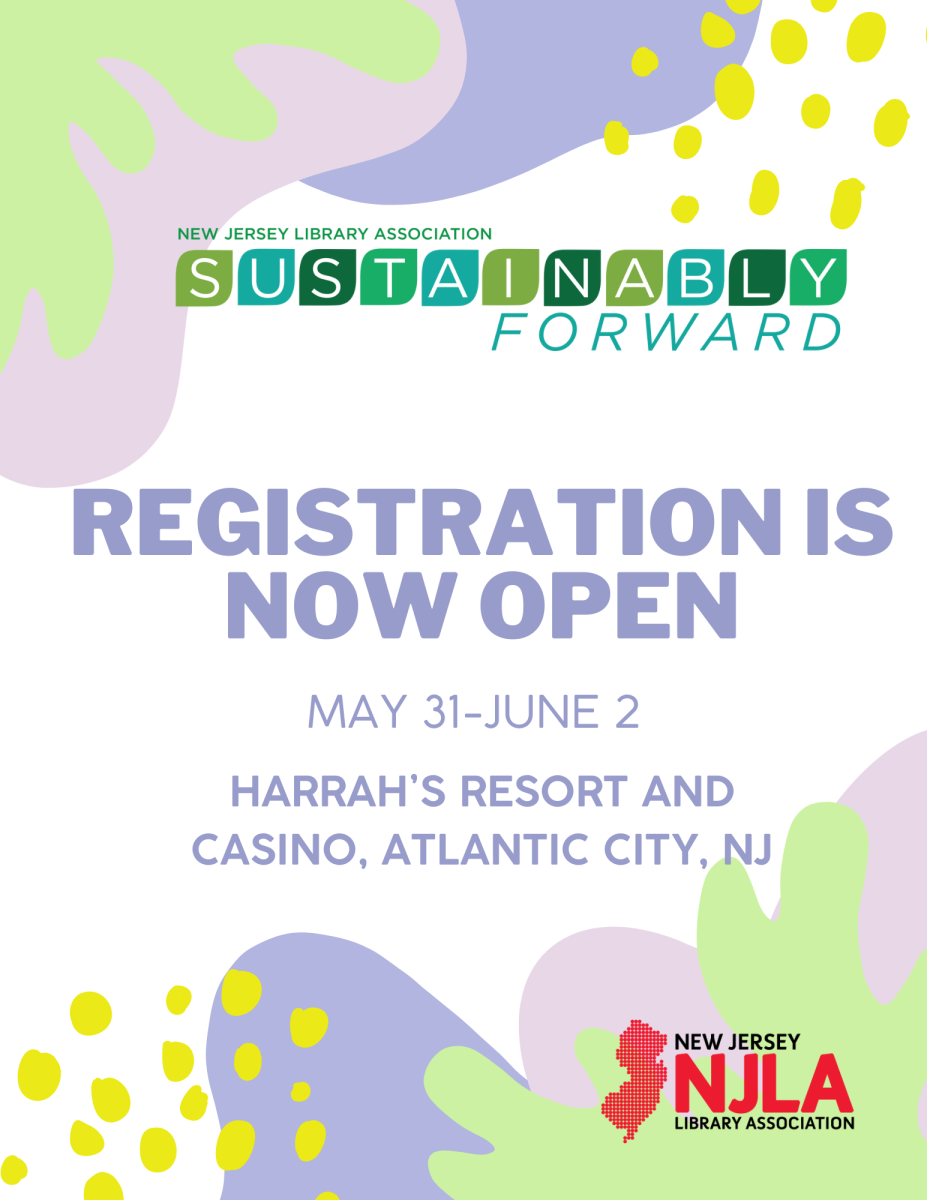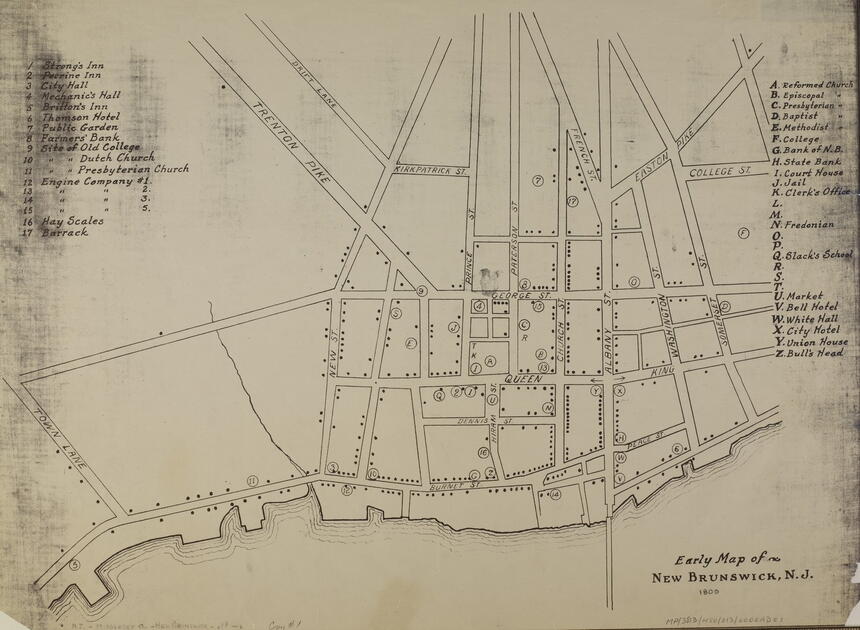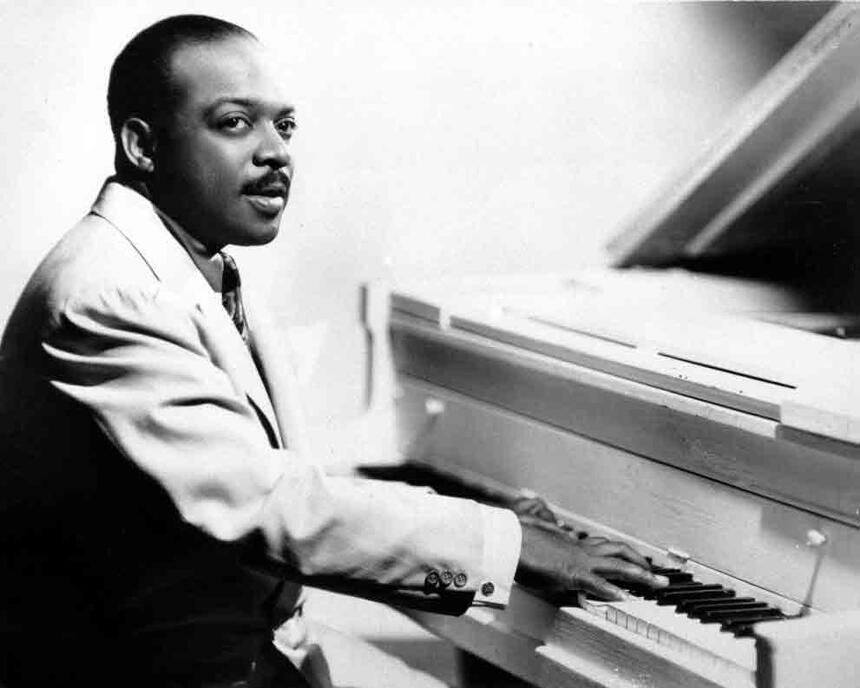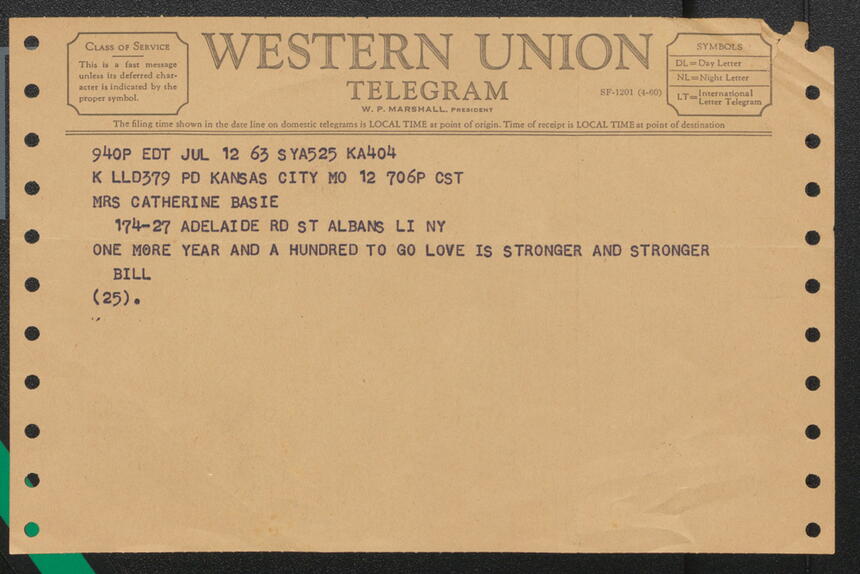Spring 2023 CUS/ACRL-NJ Newsletter

From the President
By Nicole Potdevin
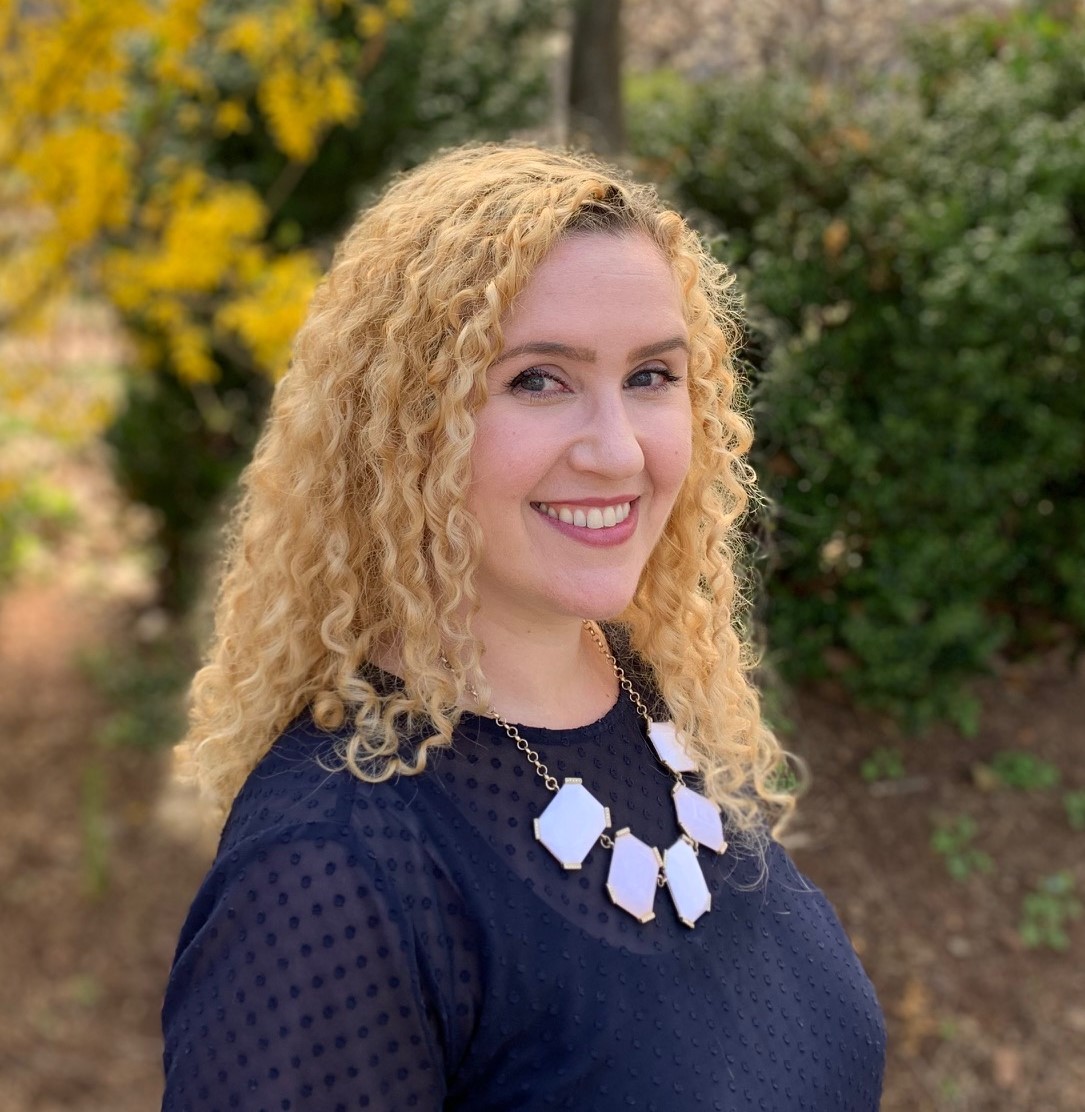
At long last we have reached the time of year where we can start to think of slowing down a bit - nature may be reawakening, but the academic year is winding down and we are starting to plan our well-deserved summer vacations. I think that this is the perfect time to take a moment to recognize all that we have accomplished so far this year, as well as look forward to future plans that energize us. I would like to use this space, therefore, to highlight some of the great work done by NJLA CUS/ACRL-NJ this year as well as share news of some exciting things to come.
We began 2023 with the New Jersey Academic Libraries Conference held virtually on January 6th. It was so heartening to see so many attendees as well as all the fantastic posters, presentations, lightning talks, and roundtable discussions. We received a great deal of positive feedback about the conference but heard you loud and clear that many of you miss having the conference in person. The Conference Planning Committee will be starting work on the 2024 NJAL Conference in the next few weeks, so if you would like to volunteer, please contact our Conference Co-Chair Alyssa Valenti at Alyssa.Valenti@raritanval.edu.
I am very happy to announce that our Website Liaisons, Janelle Bitter and Joe Louderback, with the assistance of Vice-President/President-Elect Gary Marks, have recently completed their work creating a new Documents Repository of useful materials created by NJLA CUS/ACRL-NJ Committees. This repository will be regularly updated with Executive Board and Committee meeting minutes as well as useful documents created in the course of committee work, such as best practices, bibliographies, and other materials that have use beyond our organization. We hope that librarians, regardless of their affiliation with this organization, can make use of these materials in their own work.
While I am extremely proud of the work we have completed in the past few months, there is still a lot to look forward to. The NJLA Conference is coming up in just a few weeks. It will be held in person at Harrah’s in Atlantic City on May 31st-June 2nd. I have heard from many of you that you will be presenting and/or attending, so if you haven’t already done so, please register to attend. The lineup of presentations looks like it will have something for everyone, not to mention that we will be holding our Section Luncheon on Friday, June 2nd at 12:30pm with the theme “Creating and Sustaining Connections”. This is always a great opportunity to catch up and network with your fellow academic librarian colleagues, so I hope to see you there.
Last but not least, I will also mention here the creation of a new Membership Assessment Task Force. The purpose of this Task Force is to gauge the current levels of membership within NJLA CUS and ACRL-NJ, to undertake an assessment of attitudes towards NJLA CUS/ACRL-NJ among NJ academic librarians, and to create and implement a plan to engage/re-engage with NJ academic librarians to increase active membership within the organization. The work of this Task Force will certainly take a while to complete, but it is crucial for the survival of this organization since it can only exist with the buy-in of NJ academic librarians. Regardless of your membership status, please be on the lookout in the coming months for a communication asking you to share your feedback with us so we can serve you better.
While I am sure I am not the only one eager to take a break in the coming months, I am also really looking forward to continuing the work of this organization and seeing the amazing things our colleagues will accomplish in the 2023-24 academic year. I hope to see you all at the NJLA Conference and wish you all a happy and relaxing summer!
Nicole Potdevin is the Associate University Librarian for User Services at Fairleigh Dickinson University. She can be reached at potdevin@fdu.edu.
In This Issue...
- From the President
- Announcements
- Ray Schwartz Retires from William Paterson University
- VALE Updates
- Seton Hall University Receives State Grant for Collaboration
- Rutgers Graduate Student Chapter Keeps Momentum Going in Challenging Times
- The Human Library at Brookdale Community College
- History, Now and Then: Teaching Historiography and Information Literacy to High School Students
- Treasures in One's Own Backyard: Moon Series Milestone
- CUS Intern Grows from Experience
- 2023 CUS/ACRL-NJ Research Award
- 2023 CUS/ACRL-NJ Technology Award
- On Exhibit: Paul Robeson: Activist, Artist, Actor, Alum
- TikTok: Time to Reflect on the Past Year
- Rutgers University Libraries News
Ray Schwartz Retires from William Paterson University
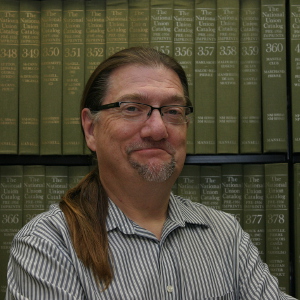 After 27 years with three state universities in New Jersey, Ray Schwartz, Head of Library Information Systems, retired on January 1, 2023. Ray joined the Cheng Library in October 2004 as Systems Librarian, responsible for supporting the Library’s integrated library system and other library technologies. In 2016, Ray was promoted to Head of Library Information Systems. One of his initial tasks was serving as project manager, from implementation to completion, during the library’s transition to the Ex Libris Alma platform.
After 27 years with three state universities in New Jersey, Ray Schwartz, Head of Library Information Systems, retired on January 1, 2023. Ray joined the Cheng Library in October 2004 as Systems Librarian, responsible for supporting the Library’s integrated library system and other library technologies. In 2016, Ray was promoted to Head of Library Information Systems. One of his initial tasks was serving as project manager, from implementation to completion, during the library’s transition to the Ex Libris Alma platform.
Ray has presented and participated at library associations and committees at the regional, national, and international levels for over 30 years. Notable is his involvement with IFLA (International Federation of Library Associations), IGeLU (Joint International Group of Ex Libris Users), ELUNA (Ex Libris Users of North America) and ENUG (Ex Libris Northeast Users Group).
Ray will continue to be involved in library development, research, and mentoring. In addition, he plans to be more involved with the arts and community issues in Jersey City. Enjoy your retirement, Ray!
VALE Updates
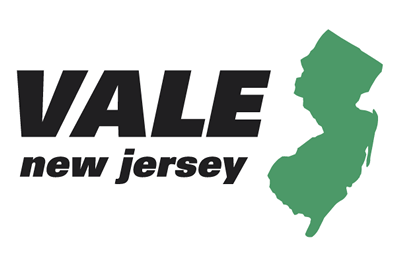
The season of change at VALE, announced in the Fall NJLA newsletter, continues steadily in Spring. After five months on the job, I still don’t fit into Melissa Lena’s shoes, although they’re not as loose as they used to be! Kurt Wagner (Monmouth) and Leigh Keller (Ramapo), co-chairs of our Purchasing and Licensing committee, also are still adjusting to the ebbs and flows of consortial database acquisitions. And just as we feel a little comfortable with our chores, up comes annual renewals–but more on that later.
Since we last reported, VALE addressed the thorny “WALDO-Lyrasis matter.” You recall that WALDO ceased operations over a year ago, handing its existing contracts to Lyrasis. This transition meant that twenty-four VALE members who, through WALDO, subscribed to sixteen databases from nine vendors now had one year to decide to join Lyrasis to maintain these subscriptions. The trouble was, many of these VALE libraries did not want to join Lyrasis, urging VALE to step in, and we did. We’re negotiating with the nine vendors to offer their products through VALE to give our members a choice of whether or not to join Lyrasis. This project is ongoing and now butts up against our renewal cycle, which makes us nervous. But the bright side is that we’ve discovered that many other VALE members deal with these nine vendors directly, giving VALE a chance to persuade these members to subscribe through VALE, increasing our e-resources traffic. Stay tuned!
Speaking of renewals, we’ve taken the first step in the process, which is contacting vendors to discuss FY24 pricing. Of the eighteen vendors contacted, six have responded, and only one of the six reported an increase of over three percent. That offer is an initial one, so we’ll see. The next step is to have vendors fill out spreadsheets with agreed-upon pricing which are then uploaded to Consortia Manager. In May, We’ll publish renewal and new product pricing to your ConsortiaManager account. You’ll notice we haven’t said much about adding new product offers, trials, and the like. It’s because we haven’t done much on that score over the last several months, simply because we’re too busy learning the workflows we need to know to maintain these subscriptions. Our goal is to increase e-resource offers in FY25, which we’ll pursue vigorously once we master our workflows.
Please contact me with questions about VALE services. I look forward to hearing from you!
Joe Toth is the Interim Program Manager at VALE. Joe has worked at Ocean County College and Stockton University and has held several VALE committee positions over the last decade. He can be reached at joe.toth@njedge.net.
Seton Hall University Receives State Grant for Collaboration
By Kyle Downey
In April of 2022, the Office of Grants and Research Services at Seton Hall University (SHU) awarded faculty researchers in the University Library and in the School of Health and Medical Sciences (SHMS), the Cultivating Research, Innovation and Talent component of the New Jersey Opportunity Meets Innovation (OMI) Challenge Grant. The aim of the grant project was to study recently graduated Doctor of Physical Therapy (DPT) students to assess their beliefs, self-efficacy, and cultural readiness related to evidence-based practice (EBP). EBP is the integration of clinical expertise, patient values, and the best research evidence into the decision-making process for patient care.1 During their course of study at SHU, these students had participated in an updated curriculum developed by a health sciences librarian and DPT faculty which integrated the five steps of evidence-based practice (EBP) into their curriculum. This longitudinal cohort study (which ends this December) will assess the impact of the curriculum redesign on these newly licensed Doctor of Physical Therapy.
While the grant was awarded back in 2022, the collaboration between the librarian, Kyle Downey (left), and the School of Health Medical Sciences professors, Angela Lis (below, right) and Lauren Snowden (below, left), date back to the summer of 2018, when the new interprofessional health sciences (IHS) campus was established in Nutley, New Jersey. Downey, who was recently hired as a liaison librarian for SHMS and the College of Nursing at Seton Hall earlier that summer, was quickly introduced to Professor Lis. The two worked together along with Professor Snowden to review and revise the curriculum considering the newly published guidelines for teaching EBP skills in a DPT program. Over the course of several meetings, the three worked out a curriculum that would include a significant amount of library instruction for the DPT graduate students.
One of the first tasks was to move away from the traditional one-shot library instruction session that is so frequently taught to first-year graduate students. By embedding the librarian into the didactic courses of Critical Inquiry I and Critical Inquiry II, the core concepts and skills required for EBP would be taught early on and continually reinforced over the duration of the DPT program. No longer would the librarian just be introduced during the first year of the program, but rather, would be involved in EBP instruction throughout the full 3 years.
A web-based PT Toolkit (research guide) has been implemented and contains all tools required for the successful integration of EBP skills into the students didactic and clinical learning. Downey worked with Lis to create a usability survey for the students to use with the aim of collecting information on how accessible and useful these guides are. Most of the student feedback was positive, and small changes and additions were added over time, including a “create an alert” guide and additional links to outside organizations that have resources on clinical practice guidelines and clinical summaries.
Being awarded the OMI grant is a major step in the continuation of this strong interdisciplinary collaboration. Working alongside Physical Therapy faculty and two student volunteers, the grant will allow the team to assess if recent DPT graduates retain and apply learned EBP skills once they join the clinical workforce. Students may volunteer to be included in study by taking the “Self-Assessment of EBP skills” Qualtrics survey, in which they are awarded a $20 Amazon gift card upon completion.
Will the efforts of an embedded librarian pay off? Will the resources that have been developed during the curriculum revision continue to be utilized? We hope that this project will answer these important questions, as it has implications not only for our work at SHU, but for the wider Physical Therapy and Health Sciences library community. In the meantime, this collaboration between the library and physical therapy department will only continue to grow stronger.
Acknowledgements:
I’d like to thank the students research assistants for their help and assistance during the grant project. Jenna Eoga is a DPT student at Seton Hall University. Suchismita Sahu is a graduate student in the Master of Healthcare Administration program at Seton Hall University. Both have helped with the creation and implementation of the Qualtrics survey as well as collecting and organizing the data for our statistician to assess.
Reference
1. Sackett DL. Evidence-based medicine. Semin Perinatol. 1997;21(1):3-5. doi:10.1016/s0146-0005(97)80013-4
Kyle Downey is a librarian at the College of Nursing & School of Health and Medical Sciences at Seton Hall University.
Rutgers Graduate Student Chapter Keeps Momentum Going in Challenging Times
By Maryalice Rocks
It has been an exciting time for SCARLA, the Student College, Academic, and Research Libraries Association at Rutgers University, with academic life and activities approximating pre-Covid levels for the first time in three years.
Following up on the energy of the Banned Books event it co-sponsored in September, SCARLA planned and executed a virtual discussion panel with current Rutgers librarians, held on November 17, 2022. The panel featured librarians from diverse backgrounds and positions within the Rutgers Library system—including Leslin Charles (Instructional Design Librarian, Carr Library); Kayo Denda (Head, Margery Somers Foster Center & Librarian for Women’s Gender and Sexuality Studies, Douglass Library); and Fernanda Perrone (Archivist & Head, Exhibitions Program, Alexander Library). Panelists first described the work they do now, giving an insider glimpse into various day-in-the-life scenarios for a Rutgers librarian. They also spoke about their career paths and what led them to their current position at Rutgers, and talked about which MI (Master of Information) classes they found most valuable to prepare for their current role. Following these insights, participants had the opportunity to ask a variety of questions during the open Q&A, on topics such as research interests, collaborations, and more.
SCARLA enjoys strong collaborative relationships with its two sister organizations at Rutgers: LISSA (Library and Information Science Student Association) and SOURCE (the Society of American Archivists student chapter). On February 16, the three student groups co-sponsored the perennial student favorite, “Chat & Chill,” a series that brings guests representing diverse areas of librarianship to Rutgers—virtually—for an informal talk with MI students. Past presenters have included leaders in the field such as Emily Drabinski, Nancy Kranich, and countless others. This time, students were excited to welcome Amy C. Vo, who is Special Collections Processing Archivist at Princeton University Library. The dialog presented a perfect opportunity for those considering careers in archives/preservation or higher education to listen to Vo talk about her job, ask questions about her career path, and connect with classmates who have similar interests.
On February 23, SCARLA held its CritLib Collective, an annual offering in which participants read a selected scholarly article about some aspect of critical librarianship and discuss it in an open forum composed of current MI students, faculty, and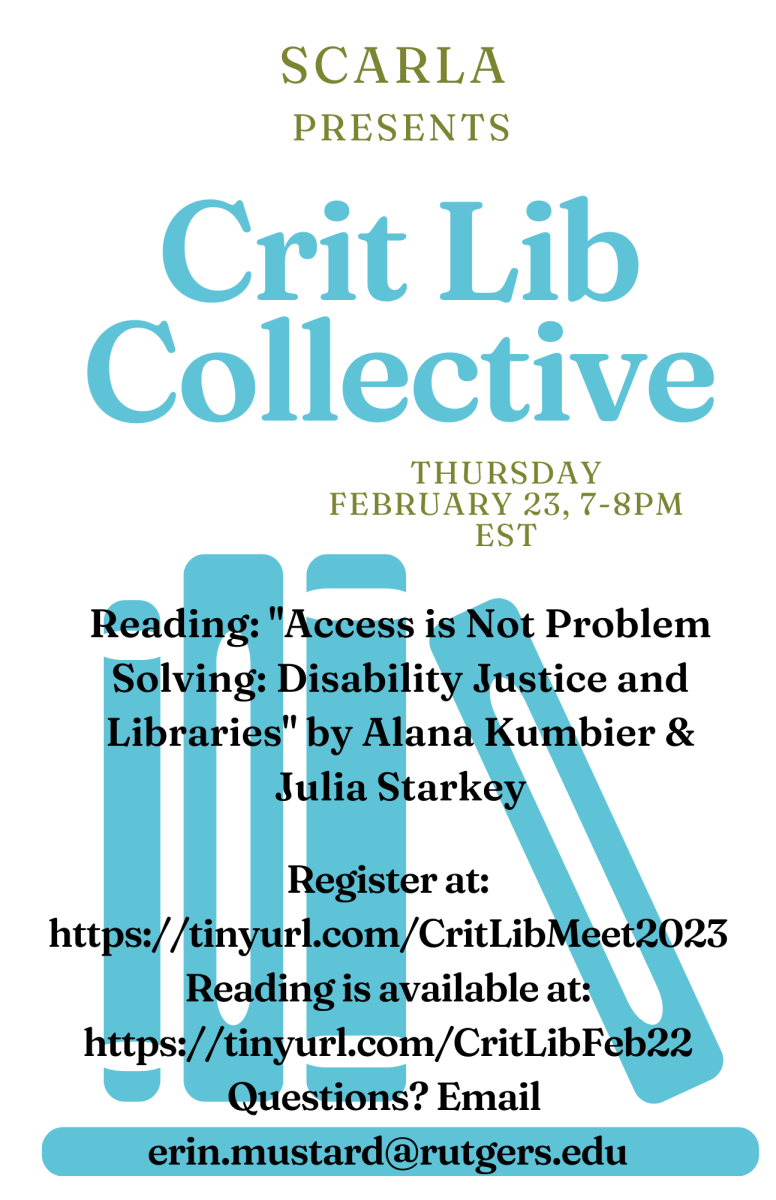 practicing librarians. For this most recent iteration of the series, the group chose “Access is Not Problem Solving: Disability Justice and Libraries,” by Alana Kumbier and Julia Starkey. (DOI: https://doi.org/10.1353/lib.2016.0004) The conversation was lively, and participants discussed creative and just ways to address access, sharing best practices from personal experiences and the literature.
practicing librarians. For this most recent iteration of the series, the group chose “Access is Not Problem Solving: Disability Justice and Libraries,” by Alana Kumbier and Julia Starkey. (DOI: https://doi.org/10.1353/lib.2016.0004) The conversation was lively, and participants discussed creative and just ways to address access, sharing best practices from personal experiences and the literature.
While the e-board was busy developing its next big event—a virtual panel with RU School of Communication & Information (SC&I) Alums planned for April 19—contract negotiations had stalled between Rutgers administration and several of its faculty unions, resulting in a strike action by the unions starting on April 10. Choosing to not cross the picket line, even virtually, SCARLA made the difficult decision to postpone the panel in solidarity with those seeking fairer pay and more job security. Subsequently, on April 15, a tentative agreement between Rutgers’ administration and the unions was reached, resulting in a suspension of the strike. A new date for the panel has not been announced as of this writing, but the board continues to be excited about the group of speakers it has assembled, including Wafa Fatima Isfahani (Librarian for Special Collections, Al-Furqan Islamic Heritage Foundation), Fobazi Ettarh (independent librarian, scholar and consultant), Lorin Jackson (Executive Director for Region 2 Regional Medical Library at Medical University of South Carolina), and Vanessa Kitzie (Associate Professor, University of South Carolina). Panelists will discuss their professional interests, life after graduation, job searches, and advice for current students. Their presentations will be followed by a Q&A session, with participants having the option to submit questions ahead of time or ask them during the event.
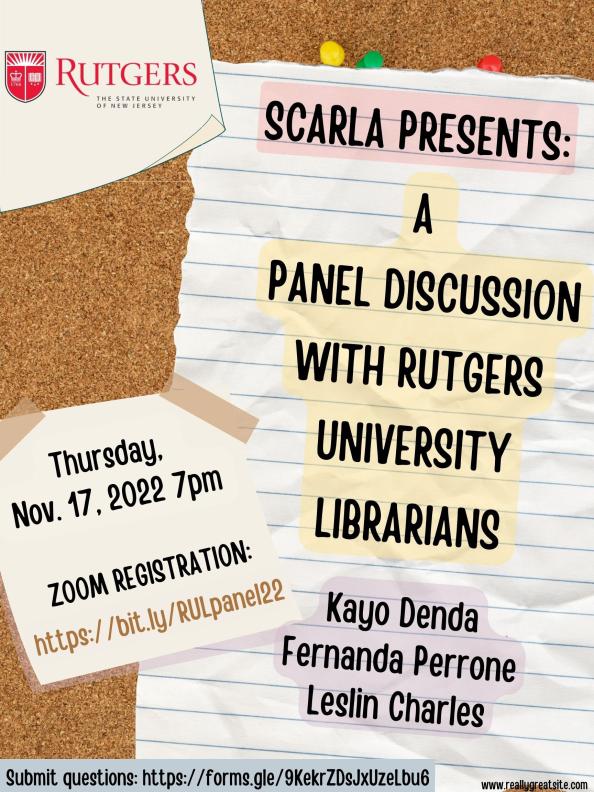 Also in April, SCARLA held an election for its slate of officers for the 2023—2024 academic year. The board thanks its graduating members, outgoing president Victoria Sun and secretary Desmond Kidney, for their unwavering dedication and leadership during challenging times. It welcomes with excitement its newly-elected officers: Carolyn Quimby (president); Erin Mustard (vice president), M.A. Rocks (treasurer); Bethany Falcon (secretary); and David Moles (webmaster).
Also in April, SCARLA held an election for its slate of officers for the 2023—2024 academic year. The board thanks its graduating members, outgoing president Victoria Sun and secretary Desmond Kidney, for their unwavering dedication and leadership during challenging times. It welcomes with excitement its newly-elected officers: Carolyn Quimby (president); Erin Mustard (vice president), M.A. Rocks (treasurer); Bethany Falcon (secretary); and David Moles (webmaster).
SCARLA is the graduate student organization at Rutgers University dedicated to academic and research librarianship; it is affiliated with the NJLA College and University Section and the New Jersey Chapter of ACRL. SCARLA’s current president is Victoria Sun; Erin Mustard is the vice president. Current executive board members include Bethany Falcon, Desmond Kidney, David Moles, Carolyn Quimby, and M. A. Rocks. SCARLA’s faculty advisors are Dr. Marie Radford and Dr. Gretchen Stahlman. For more information, including details about upcoming events, visit https://scarla.rutgers.edu.
Those interested in connecting with SCARLA, can join the listserv by sending an email to comminfo_scarla-join@email.rutgers.edu, with the word “subscribe” as the subject line. They can also email Dr. Marie Radford (one of SCARLA’s faculty advisors) at mradford@comminfo.rutgers.edu.
Anyone who has an employment or internship opportunity for the SC&I Job Board, please email details to Ildi Koczan, Assistant Director of Student Services for Careers at ildi.koczan@rutgers.edu.
Maryalice Rocks serves as SCARLA Executive Board Member-at-Large. SCARLA is the Student College, Academic, and Research Libraries Association at Rutgers University.
Announcements
Bergen Community College
Marquan Mutazz is a new part-time librarian at Bergen Community College in Paramus. Currently a retired Academic Librarian I/Associate Professor at Kean University, Marquan has been a librarian for 33 years. He is also a military veteran a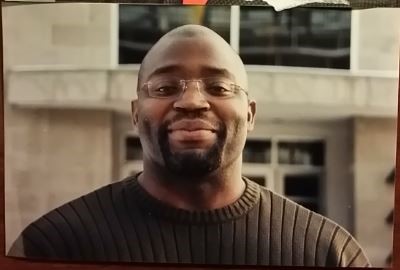 nd has coached football for 29 seasons. Most notably, he has coached the defensive line at Weequahic High School in Newark; last year his team won the North Jersey Section 2 Group 1 State Championship. He is excited to become a part of the Bergen Community College family and looks forward to working with the library’s talented group of administrators, faculty, and staff. He says, “It is refreshing and a blessing to be considered for the position of part-time reference librarian at Bergen Community College. The library has a great reputation for excellence.”
nd has coached football for 29 seasons. Most notably, he has coached the defensive line at Weequahic High School in Newark; last year his team won the North Jersey Section 2 Group 1 State Championship. He is excited to become a part of the Bergen Community College family and looks forward to working with the library’s talented group of administrators, faculty, and staff. He says, “It is refreshing and a blessing to be considered for the position of part-time reference librarian at Bergen Community College. The library has a great reputation for excellence.”
County College of Morris
Lia Carrut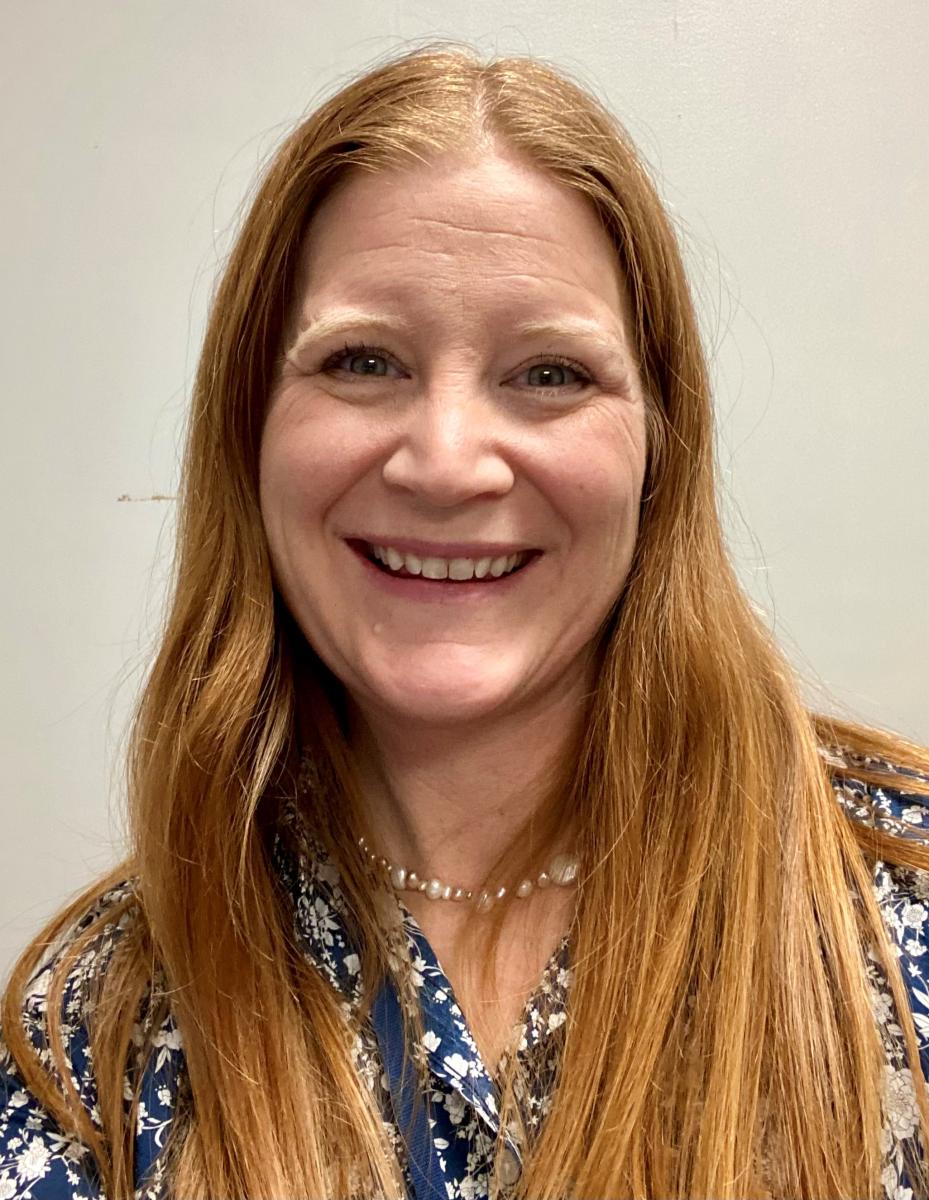 hers recently joined the staff as a Reference Librarian. Previously, she was a consultant at Scholastic.
hers recently joined the staff as a Reference Librarian. Previously, she was a consultant at Scholastic.
Fairleigh Dickinson University
Ashley Tschakert Foertmeyer (right) joined the Fairleigh Dickinson University Library as a Research and Instruction Librarian in January 2023. Originally from Central Ohio, her previous work experience includes a stint as a loan officer, a public librarian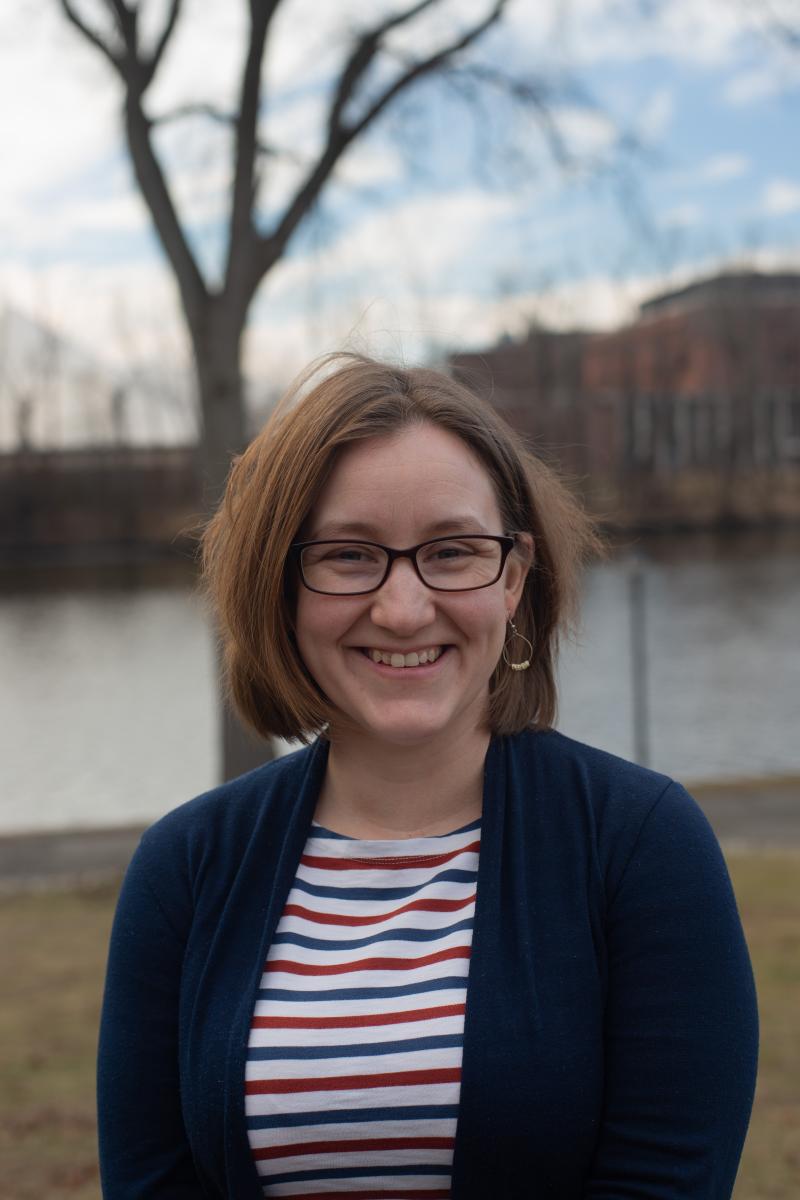 , a real estate agent, and a Research Assistant in Disability Studies. Most recently, Ashley worked as an Instructional Technology and Design Teaching Assistant at the University of Illinois Urbana-Champaign. She is excited to bring her diverse experiences to FDU.
, a real estate agent, and a Research Assistant in Disability Studies. Most recently, Ashley worked as an Instructional Technology and Design Teaching Assistant at the University of Illinois Urbana-Champaign. She is excited to bring her diverse experiences to FDU.
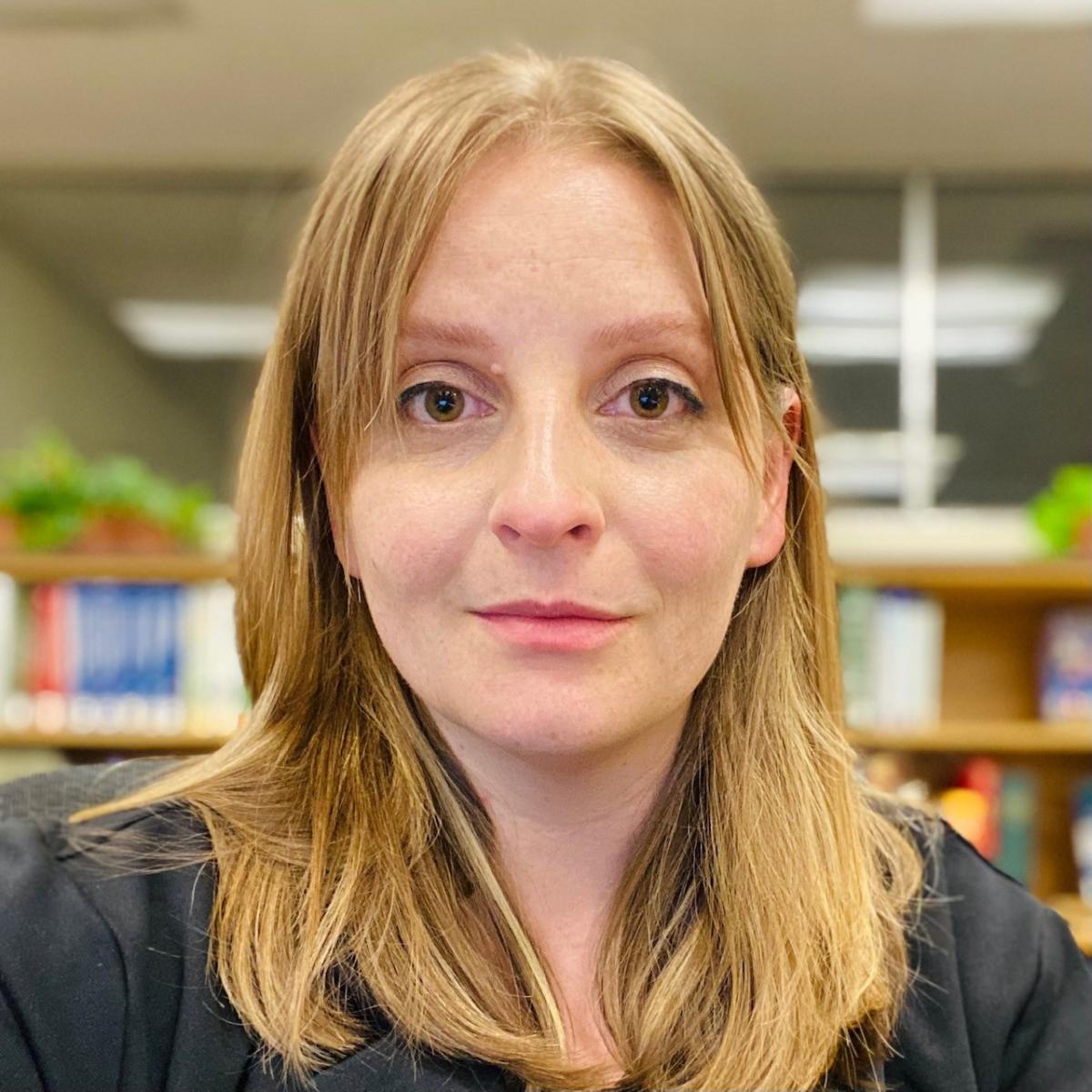 Brooke Duffy (left) joined the Fairleigh Dickinson University Library team as a Research and Instruction Librarian in December 2022. Prior to working at FDU she coordinated library instruction at Seton Hall University Library. She has also previously been a librarian at Sarah Lawrence College, Mercy College, and Fairfield University libraries, and she graduated from the Pratt Institute with an MSLIS and MS in Art History in 2013. Brooke enjoys teaching and learning from students, and using creativity, mindfulness, and cultural humility to inform her practice as a librarian.
Brooke Duffy (left) joined the Fairleigh Dickinson University Library team as a Research and Instruction Librarian in December 2022. Prior to working at FDU she coordinated library instruction at Seton Hall University Library. She has also previously been a librarian at Sarah Lawrence College, Mercy College, and Fairfield University libraries, and she graduated from the Pratt Institute with an MSLIS and MS in Art History in 2013. Brooke enjoys teaching and learning from students, and using creativity, mindfulness, and cultural humility to inform her practice as a librarian.
Rowan University
Dan Kipnis, Life Sciences Librarian at Campbell Library, presented two posters at the March 2023 Association of Research and College Libraries conference. The first authored with public services librarian Andrea Baer from the Campbell Library: “Never Judge a Website by its Cover: A Mixed-Methods Investigation into the Effectiveness of a Tutorial on Lateral Reading” and the second with Institutional Repository & Engineering/Physical Sciences Librarian Denise Brush from the Campbell Library “An Investigation of Gold Open Access publications of STEM faculty at a public university in the United States”, which was also published in Science and Technology Libraries.
Rutgers University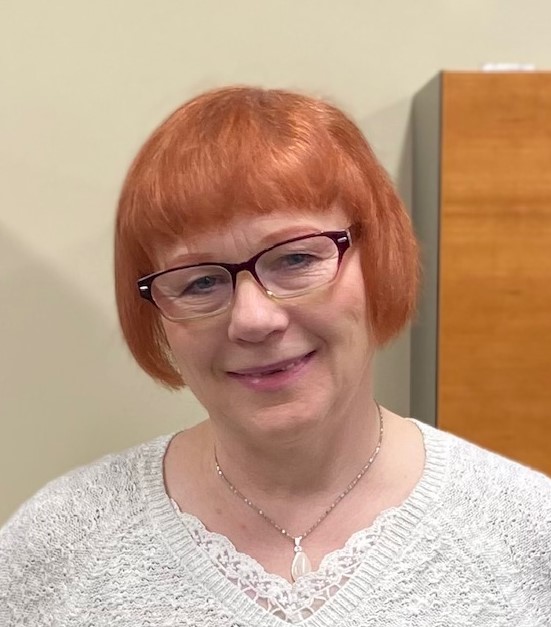
Maria Deptula (right) is now Collection Development Librarian at Rutgers Biomedical and Health Sciences Libraries. She was previously at Berkeley College.
Rutgers University Libraries and the Black Bibliography Project (BBP) are delighted to announce the appointment of Dr. Tajah Ebram (below) as Black Studies Librarian. In addition to supporting faculty and students working in Black studies, Dr. Ebram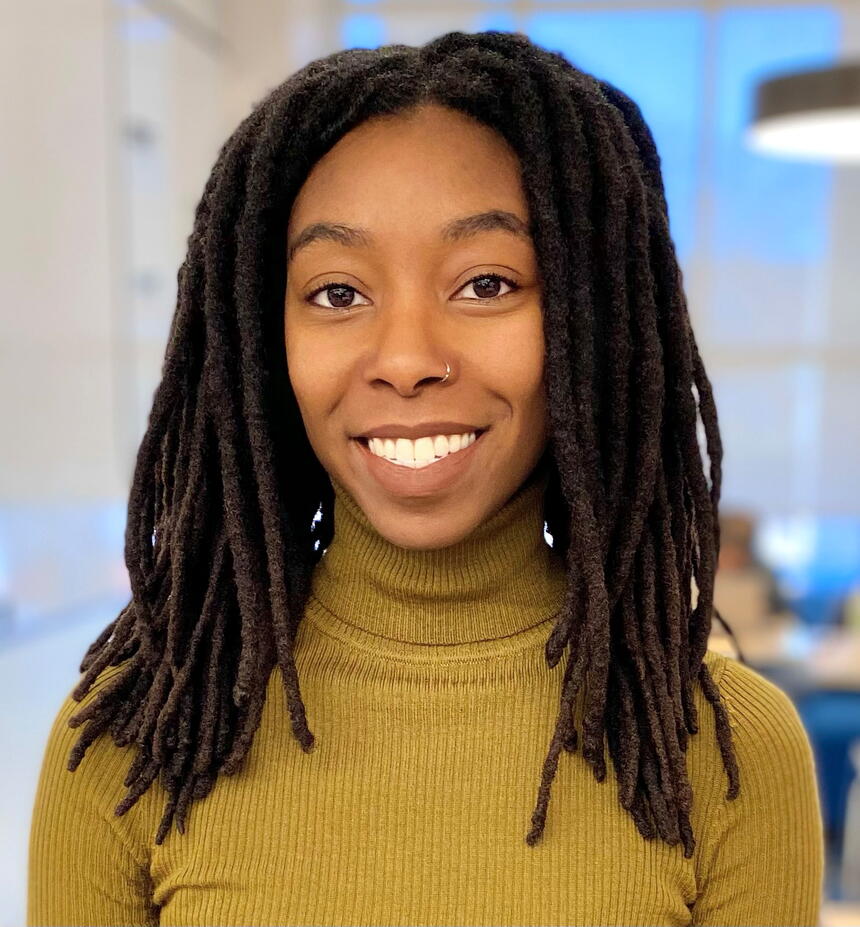 will serve as the Rutgers lead for the BBP, which seeks to revitalize the practice of bibliography for African American literary and cultural studies. She will be based in Alexander Library, collaborating across the campus and with BBP colleagues at Yale University. Dr. Ebram received her PhD in 2020 from the University of Pennsylvania, specializing in 20th-century Black literary and cultural studies, with a focus on Black radicalisms. Her dissertation was an interdisciplinary cultural history of the MOVE Organization. Dr. Ebram comes to us from Haverford College, where she taught courses on Black Philadelphia, race and ecology, and Black feminisms and the carceral state. She brings additional expertise in cultural geography, public humanities, and digital humanities.
will serve as the Rutgers lead for the BBP, which seeks to revitalize the practice of bibliography for African American literary and cultural studies. She will be based in Alexander Library, collaborating across the campus and with BBP colleagues at Yale University. Dr. Ebram received her PhD in 2020 from the University of Pennsylvania, specializing in 20th-century Black literary and cultural studies, with a focus on Black radicalisms. Her dissertation was an interdisciplinary cultural history of the MOVE Organization. Dr. Ebram comes to us from Haverford College, where she taught courses on Black Philadelphia, race and ecology, and Black feminisms and the carceral state. She brings additional expertise in cultural geography, public humanities, and digital humanities.
Yan Lu retired as Library Associate II at Scholarly Communication and Collections, effective March 1.
Iliana Bernal retired as Library Associate I at Dana Library, effective March 1.
Hadiyah Sellers joined Rutgers University Libraries as Human Resources Manager, effective March 13.
Christine Williams retired as Library Specialist III at Smith Library, effective February 1.
Xueying Ren resigned as Information and Education Librarian at Smith Library, effective February 1.
Stephanie Bartz retired as Government Resources and Information Services Librarian and NTT Librarian of Practice III at New Brunswick Libraries, effective February 1.
Ayesha Salim resigned as Business Specialist at Dana Library, effective January 21.
Yini Zhu retired as Managing Librarian and Acting Associate Director at Smith Library, effective January 1.
Nancy Kranich accepted an appointment at the School of Communication and Information, effective January 1.
Erika Gorder was appointed University Archivist for Special Collections and University Archives, effective January 1.
Mina Ghajar was appointed Education and Research Librarian at Smith Library, effective January 1.
Jamie Friday retired as Library Technician I at Smith Library, effective January 1.
Tara Maharjan resigned as Processing Archivist for Special Collections and University Archives, effective December 2.
Priyanka Naik joined Dana Library as Administrative Assistant, effective November 28.
Jacqueline Hutton joined Dana Library as Library Associate II, effective November 28.
Hannah D’Erasmo joined Rutgers University Libraries as Library Associate I, Administration and Technology, effective November 28.
Pamela Waid resigned as Manager of Human Resources for Rutgers University Libraries, effective November 19.
Jonathan Laskey joined New Brunswick Libraries as Library Associate II, effective November 14.
Michele Petosa is serving as Acting Manager of Human Resources for Rutgers University Libraries, effective November 11.
Paul Cabelli retired as Library Associate II, Administration and Technology, effective November 1.
Articles:
Pam Hargwood, Clinical Librarian at Robert Wood Johnson Library, co-authored an article in JBI Evidence Synthesis (21[1], 33–97): “Experiences and perceptions of nurses working night shift: a qualitative systematic review.” > Link to article
Pam Hargwood co-authored an article in JBI Evidence Synthesis (20[12], 3034–3044): “Methods of training lay individuals in the use of evidence-based services for the management of mental and behavioral health disorders: a scoping review protocol.” > Link to article
Mina Ghajar, Education and Research Librarian at Smith Library, co-authored an article in JSES Reviews, Reports, and Techniques (published online): “The learning curve for anatomic and reverse total shoulder arthroplasty: A systematic review.” > Link to article
Jonathan Torres co-authored an article in Science & Technology Libraries (42[1], 1–18): “Discovering Open Access Trends in Engineering: A Bibliometric Analysis of Open Access Publications at a Large Research University.” > Link to article
Books:
Mary Beth Weber, Head of Central Technical Services, and Melissa De Fino, Special Collections and Formats Technical Services Librarian, published Virtual Technical Services: A Handbook in May 2022 (Rowman & Littlefield, 9781538152621), which stemmed from their experience working remotely during the COVID-19 quarantine.
Book Chapters:
Julia Maxwell, Social Sciences Librarian at Alexander Library, contributed to a book chapter in Using Open Educational Resources to Promote Social Justice (57–78, Chicago: Association of College & Research Libraries, 2022): “Chapter 4: Centering Justice in Content Development: A Case Study of the Police Brutality Teach-Out.”
William Paterson University
Neil Grimes announces his recent publications and presentations:
Marks, G. R., Grimes, N. D., Lafazan, B. (2022). Academic & school library partnerships: An organizational led collaboration. Cases on Establishing Effective Collaborations in Academic Libraries. IGI Global.
Marks, G. R., Grimes, N. D., Dziedzic-Elliott, E. (2023, March 18). ACRL 2023 "Forging the Future" Pittsburgh, Pennsylvania, March 15-18, 2023, "College readiness: Academic & school library partnerships, An organizational approach," ACRL, in-person, Pittsburgh, PA, United States.
Salvesen, L., Grimes, N. D. (16 March 2023). ACRL 2023 "Forging the Future" Pittsburgh, Pennsylvania, March 15-18, 2023, "Bridging the Gap: How Academic Librarians Can Support the Mental Health and Well-being of Both Our Students and Ourselves," ACRL, in-person, Pittsburgh, PA, United States.
The Human Library at Brookdale Community College
By Theresa Agostinelli and Judi Ungar
The first Human Library or “Menneskebiblioteket” in Danish; created by non-violent activist, Ronni Abergel and his brother Dany along with their coworkers, Asma Mouna and Christoffer Erichsen; took place on June 29, 2000 at a music festival in Denmark (Rimestad, 2020). At the event, people served as “books” and participants were the “readers” who could borrow a book to learn more about their story. This Human Library went on for four, full days with books including 50 different book titles representing individuals from a broad range of backgrounds, ethnicities, lifestyles, and beliefs (Rimestad, 2020). When discussing the reason why he chose to call this event a “library,” founder Ronni Abergel stated that he “...had a theory that it could work because the library is one of the few places in our community where everyone is welcome, whether you’re rich or poor, homeless or living in a castle, professor or illiterate,” he says. “It’s truly the most inclusive institution in our time. (Blake, 2021).
Following the success of the inaugural Human Library in 2000, the event has continued throughout the world; books have been published in over 88 countries (“Welcome to the,” 2022). At a Human Library, books will typically share a little bit about themselves, and the readers will ask thoughtful questions to create a dialogue. Candidates for books include individuals holding unique perspectives, people from diverse backgrounds, or anyone that might be the object of stereotypes or misunderstanding. Human Library events are designed to break down barriers and give people the opportunity to listen to stories from others who they might consider to be different from them, and possibly learn that they are more alike than they originally thought. After speaking with people of different beliefs, backgrounds, and more, the hope is that many myths and stereotypes will be dispelled.
After reading about the Human Library, Retired Bankier Library librarian, Judi Ungar was determined to become involved in the project. One day, she approached a fellow member of the Diversity Committee at Brookdale Community College, History professor Ashley Zapogna-Krug, to see if she could help to bring her dream to fruition. Ashley was on board immediately, as well as the Diversity Committee.
Judi and Ashley applied to host a Human Library event at Brookdale Community College. After the application was approved, Laura Oncea from College Relations and Janice Thomas from the International Center were quickly recruited to join the team, and the group met every Friday for months to plan. The team recruited faculty and staff volunteers, Judi created a Human Library research guide, and a webpage was created to help publicize the Human Library. Ashley and Judi also consulted with two other colleges who had held Human Library events.
Training and support for the planners was provided by the Human Library organization in Denmark, and the planners were connected with a trainer in New York who helped them to educate books and moderators. Everyone participated in practice sessions and shared best practices and tips on setting a respectful tone as well as strategies for maintaining an environment of civil discourse.
After months of careful planning, the inaugural Human Library was offered to Brookdale students, staff, and faculty on the second floor of the Bankier Library. On the main level, a green room with refreshments was set up in the full-time librarians’ office as a place for all planners, volunteers, and readers to convene, recharge, and de-stress. Library study rooms were utilized for each book, and books stayed in the same room for multiple sessions to participate in dialogues with multiple groups of readers. College President, Dr. Stout and many of the administration attended the Human Library and offered verbal and written support. Support was also provided by the Brookdale Foundation. The team of volunteers contributed by paying for supplies out of their own pockets, picking up the Human Library coordinator from New York, serving as discussion moderators, staffing the welcome table, setting up and cleaning up, and more. Student Life also donated supplies and refreshments.
Feedback from the first Human Library event was resoundingly positive. Shortly after the event, Human Library co-chairs Judi and Ashley were approached by another college about offering the Human Library on their campus.
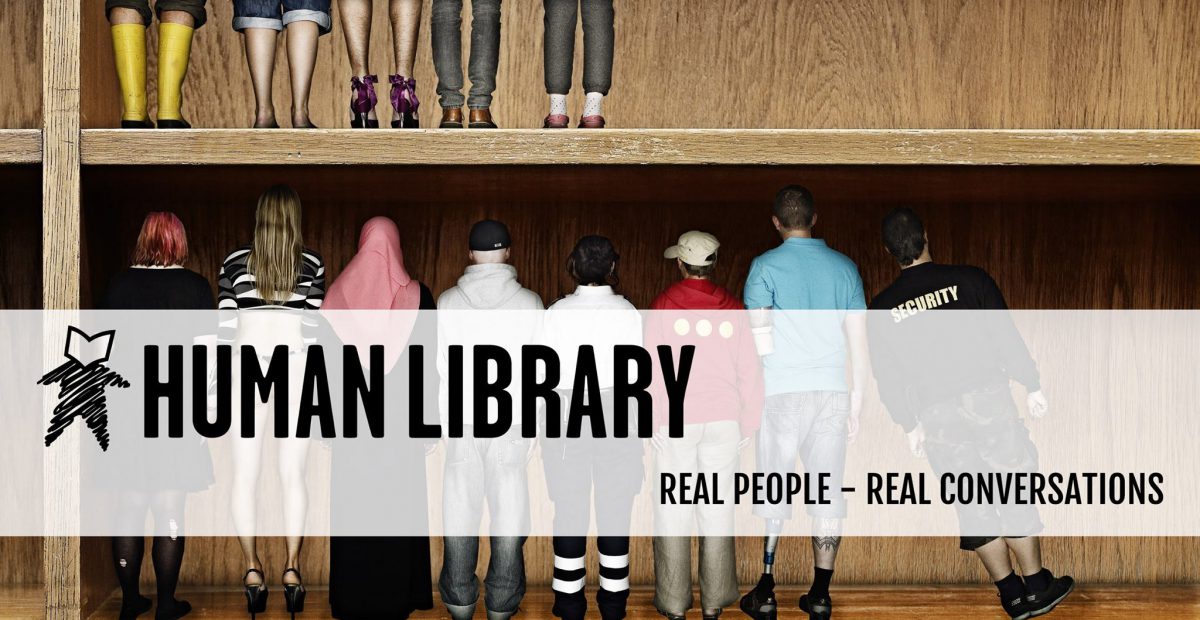 After the success of the first Human Library at Brookdale, the team decided to bring back the event with a few, small tweaks. In an effort to increase participants, the event was opened to community members, and would take place in the afternoon instead of in the evening. Since Judi Ungar retired in the spring of 2022, Ashley Zampogna-Krug enlisted the assistance of Brooke Batchler, Associate Professor-Reading to co-lead the event, and they brought in Bill McNelis, Library Director, and additional faculty and administrators to round out the planning team.
After the success of the first Human Library at Brookdale, the team decided to bring back the event with a few, small tweaks. In an effort to increase participants, the event was opened to community members, and would take place in the afternoon instead of in the evening. Since Judi Ungar retired in the spring of 2022, Ashley Zampogna-Krug enlisted the assistance of Brooke Batchler, Associate Professor-Reading to co-lead the event, and they brought in Bill McNelis, Library Director, and additional faculty and administrators to round out the planning team.
The event took place on the second floor of Bankier Library on March 9th, 2023 from 11:30 a.m. - 1:30 p.m. Like before, numerous faculty and staff volunteered their time, assisting participants, moderating discussions, and more, to help make the event a success. Books topics included addiction, gender, PTSD, poverty, sexuality, and more. As a result of switching to a morning schedule, and opening the event to non-Brookdale attendees, a busload of local high school students were able to attend, as well as multiple community members, adding variety and depth to questions and discussions.
This second Human Library event was well-run, and successful. The Human Library helps to dispel stereotypes by setting up an environment where people can get to know others in a safe setting. These events align perfectly with the DEI goals of the entire Brookdale community, and could be a good programming addition at any institution of higher education.
Resources
- Human Library
- Brookdale Community College Human Library Research Guide
- Brookdale Community College Human Library Website
References
Blake, J. (2021, November 14). This library lets you borrow people instead of books. It just may help bridge our bitter divisions. Retrieved April 13, 2023, from https://www.cnn.com/2021/11/14/health/human-library-blake-cec/index.html
Rimestad, L. (2020, August 8). Unjudge someone at the Human Library. Human Library. Retrieved April 13, 2023, from https://humanlibrary.org/unjudge-someone-at-the-human-library/
Welcome to the Human Library. (2022). Human Library. Retrieved April 14, 2023, from https://humanlibrary.org/#:~:text=The%20Human%20Library%C2%AE%20host,books%20in%20over%2085%20countries.
Theresa Agostinelli is a librarian at Brookdale Community College. She can be reached at tagostinelli@brookdalecc.edu. Judi Ungar is retired from Brookdale Community College.
History, Now and Then: Teaching Historiography and Information Literacy to High School Students
By Christina Connor and Daniel Willever
The George T. Potter Library at Ramapo College of NJ, located in Mahwah, NJ, is home to the American History Textbook Project (AHTP), a special collection established by Ramapo students in 2009. About twenty-five books spanning the nineteenth and early twentieth centuries made up the initial collection. Over the years, the collection has grown to over 300 materials, primarily consisting of high school level survey American history textbooks, and range in date from 1825-2015. This is a heavily used collection by Ramapo’s undergraduate students, mostly in history and education courses, for independent or course-related research. The collection is often used to teach historiography, which is the study of how historical narratives have evolved over time, as determined through the critical examination of secondary sources.
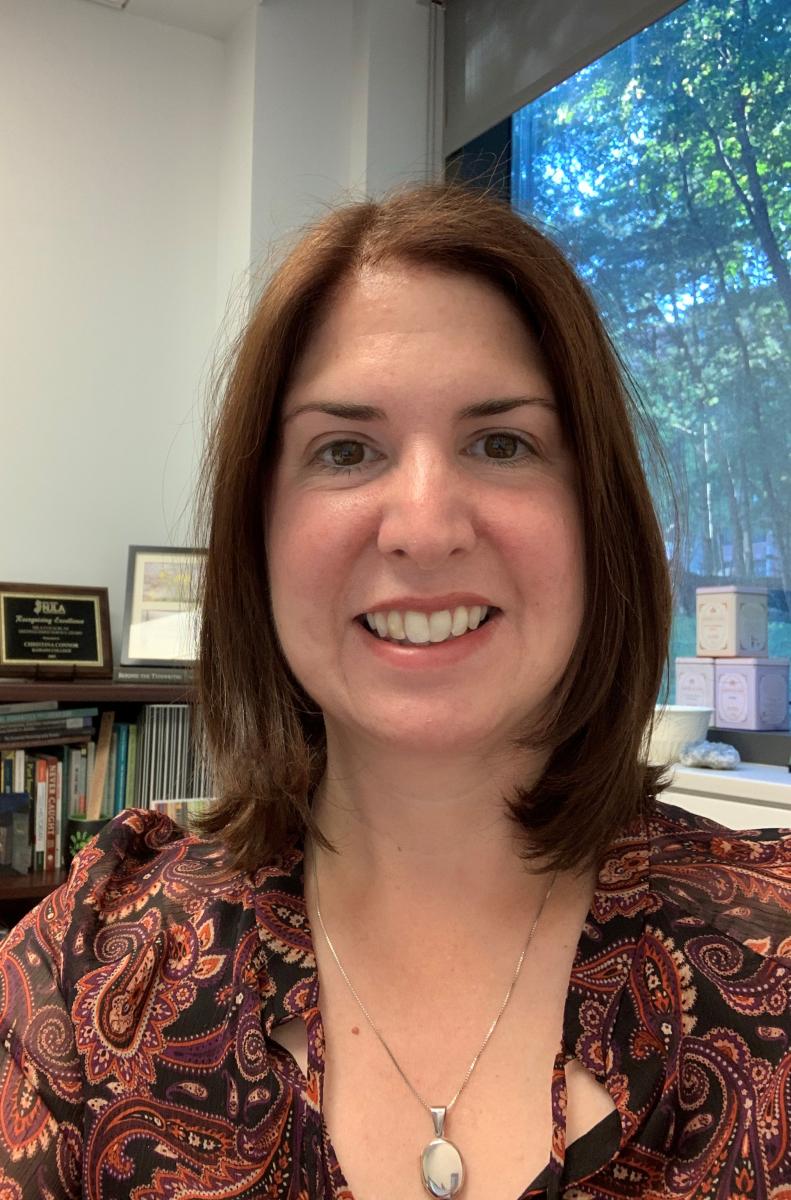 In October, 2022, students with the Ramsey High School history club came to Ramapo College on a field trip to use the AHTP collection. This collaboration began as a small virtual project during COVID in the spring of 2020, between Daniel Willever, a social studies teacher at Ramsey, and Christina Connor, Ramapo librarian and curator of AHTP. The intent of this collaboration was not only in an effort to expand outreach with AHTP beyond the campus community but also bring together information literacy and historiography with high school students. Despite learning the broad strokes of “history” in the classroom, the concept of historiography is a foreign one to most high school students. By using history textbooks, tertiary sources that distill historic concepts in a more manageable and less intimidating way, we hoped in this activity to show students that historiography doesn’t need to be a scary, academic concept. We saw this type of engagement as fruitful and a valuable application for students at all levels of education, because so many critical thinking skills are embedded within it.
In October, 2022, students with the Ramsey High School history club came to Ramapo College on a field trip to use the AHTP collection. This collaboration began as a small virtual project during COVID in the spring of 2020, between Daniel Willever, a social studies teacher at Ramsey, and Christina Connor, Ramapo librarian and curator of AHTP. The intent of this collaboration was not only in an effort to expand outreach with AHTP beyond the campus community but also bring together information literacy and historiography with high school students. Despite learning the broad strokes of “history” in the classroom, the concept of historiography is a foreign one to most high school students. By using history textbooks, tertiary sources that distill historic concepts in a more manageable and less intimidating way, we hoped in this activity to show students that historiography doesn’t need to be a scary, academic concept. We saw this type of engagement as fruitful and a valuable application for students at all levels of education, because so many critical thinking skills are embedded within it.
As we considered the structure for the day, we developed both a pre and post session assessment in addition to the main activity. Prior to the session, students were asked if and how they used textbooks in classes. Most indicated that they mainly use a textbook for “Reading and Answering Specific Questions” and “Studying for Tests and Other Assignments.” At the start of the session, we provided a brief demonstration of how students could exercise critical thinking in their approach to these foundational tertiary sources. While a few students may be familiar with recent controversies surrounding history textbooks, many take for granted that the information they receive from these sources is the singular, truthful narrative of the past. Through their work with AHTP, the Ramsey High School students emerged with a more nuanced understanding of how historical narratives are written, challenged, and evolved.
For the main activity, students were divided into groups of four based on topical interests (women’s suffrage, Native Americans, Civil War/slavery, and immigration). Students were encouraged to use the textbooks not just as information sources, but as “artifacts” of a time period. Using guiding questions on a worksheet we developed, they were asked to consider not only the basic language used, but also how that language and the author’s interpretation of a historical event or issue could impact a student reading that book. Since the students work in groups, and with books from different years or regions, they are asked to take the activity further and discuss the potential impact when generations learn different interpretations. After working together in their groups, students reported their findings and reflections to the full group. 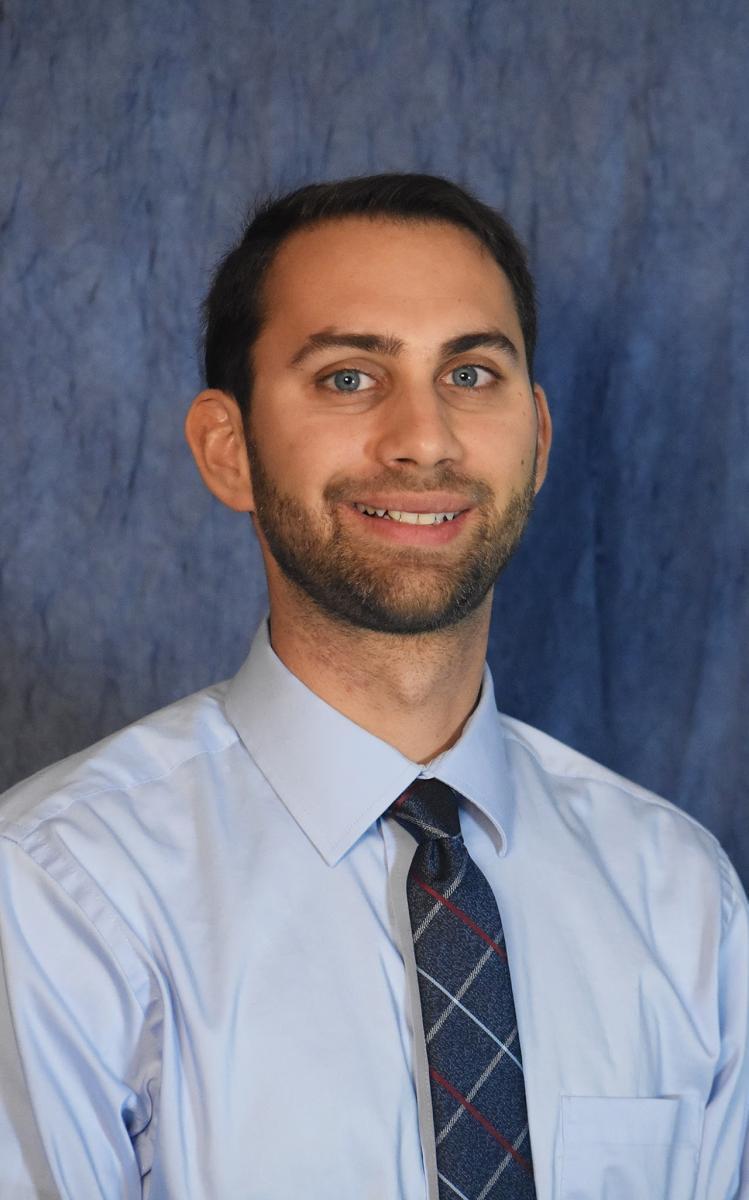
In the post assessment, 13 of 14 students who completed the exit survey said that the activity somewhat (8) or significantly (5) changed their understanding of how history is written and understood. One student reflected, “It [the activity] provided a new factor to consider while reading textbooks. Not everything I am reading is the truth and it is important for me as a member of society to acknowledge the bias within our history.” Another student wrote, “I never thought how different a textbook’s content could be based on who wrote it, where it is from, and especially when it was from. It was very interesting to see what was being taught to Americans based on what was going on at the time, and if this information they were getting was accurate. I wonder if the same thing is happening to the textbooks we are learning from today.”
For us, we feel this project provides insight into how different information sources can be used to expose high school students to a basic understanding of critical thinking and information literacy skills, as well as the disciplinary practice of historiography. Students were able to use prior knowledge and made connections to their current or former history courses. The group was thoroughly engaged for nearly two hours of work time and were observed to be consistently thinking out loud, collaborating, comparing, and utilizing historical thinking skills such as comparison and contextualization. Many students expressed an interest in working with older materials and found engaging with the physical materials interesting. Most exciting of all, most students valued the time spent working with the textbooks and many of them said they would enjoy doing so again in the future with different topics of exploration.
We hope to run this activity in the future and welcome collaborations with other institutions and high schools.
Christina Connor is the Assessment and Instruction Librarian and curator of the American History Textbook Project at Ramapo College of New Jersey. She can be reached at cconnor@ramapo.edu. Daniel Willever teaches social studies at Ramsey High School. He can be reached at dwillever@ramsey.k12.nj.us.
Treasures in One’s Own Backyard: Moon Series Milestone
By the Taylor Memorial Library Staff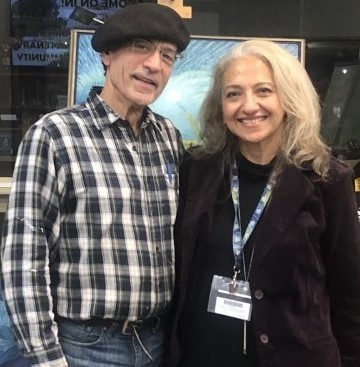
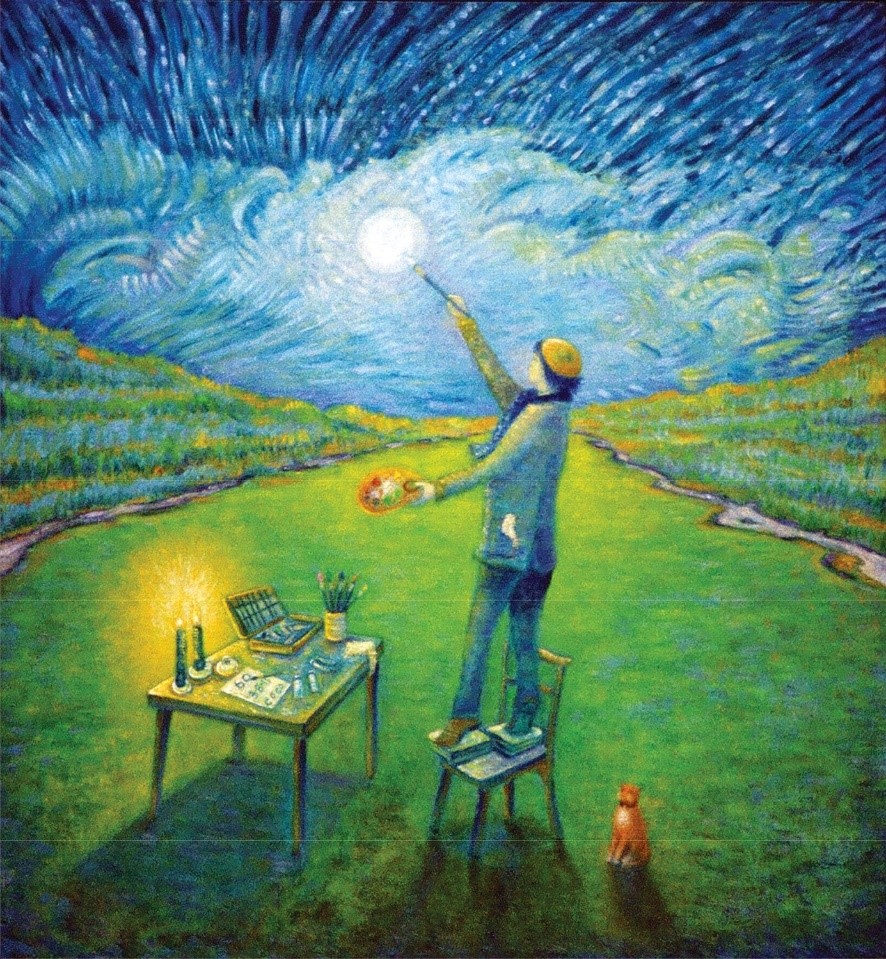 When Dr. Susan Van Alstyne became the new Director of the Taylor Memorial Library at Centenary University’s main campus in Hackettstown one year ago, one of the challenges she faced was getting students and community members back into the library after months and months of Covid closures and remote classwork. Even as the building reopened, people were not completely used to visiting. But Susan was determined to learn about her new community and was convinced there would be all sorts of people with hidden talents right in her new backyard. One of the first of those people she met was Joe Coco.
When Dr. Susan Van Alstyne became the new Director of the Taylor Memorial Library at Centenary University’s main campus in Hackettstown one year ago, one of the challenges she faced was getting students and community members back into the library after months and months of Covid closures and remote classwork. Even as the building reopened, people were not completely used to visiting. But Susan was determined to learn about her new community and was convinced there would be all sorts of people with hidden talents right in her new backyard. One of the first of those people she met was Joe Coco.
For almost two decades Professor Joe Coco has taught art at Centenary. He has taught drawing, painting, art appreciation, art history, and modern art. At the Parsippany satellite campus he also taught multiple sections of a class known as “Rock and Rap,” since he is not only an artist but also a musician. Coco was born in Passaic, New Jersey, and received a BFA from Northern Arizona University and an MFA from Rutgers. He has lived in Italy but now calls Frenchtown home. Upon meeting Joe, Susan invited him to display his art in the brightly lit spaces of the library. “Joe’s art has added life to our library,” she said. In addition, Coco’s recently published book, I Paint the Moon, is among the newest additions to the library’s book collection. For the past year Coco has displayed eight rotating installations of paintings in the Taylor Memorial Library of what are perhaps his most famous works: the “Full Moon Series.” For 50 years Coco has done paintings of the full moon. Dr. Alessandra Onuf, PhD, a professor in the art history department at the University of Hartford in Hartford, Connecticut, calls this series of paintings “a milestone."
Coco’s art has been instrum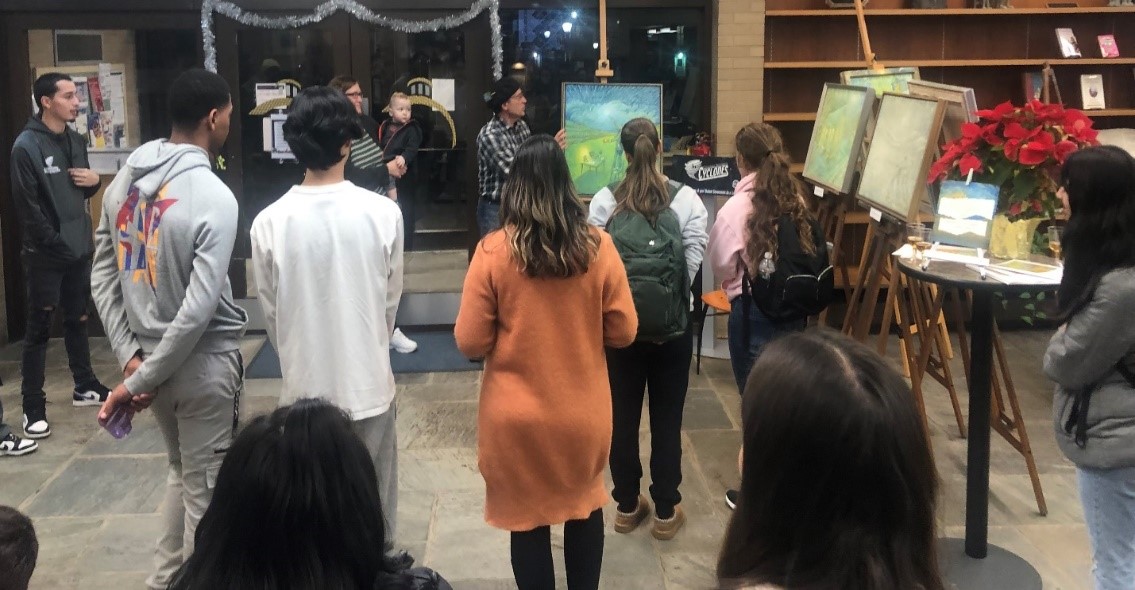 ental in bringing both students and community members back into the university library after the Covid’s disruption of in-person events. With regular rotations of new artwork, the library’s spacious front hall has been filled with colorful paintings for months. Coco’s art students have toured the exhibits, and a reception in his honor was held in the library at which the artist addressed a large audience and explained the history of his moon series as well as his artistic process.
ental in bringing both students and community members back into the university library after the Covid’s disruption of in-person events. With regular rotations of new artwork, the library’s spacious front hall has been filled with colorful paintings for months. Coco’s art students have toured the exhibits, and a reception in his honor was held in the library at which the artist addressed a large audience and explained the history of his moon series as well as his artistic process.
Currently the Taylor Memorial Library features an exhibit of 21 Coco drawings in a display titled, “Solar Eclipse and a Nuclear Holocaust.” In this series, Coco expresses solidarity with Ukraine and addresses nuclear threat present during the conflict. Visitors are welcome to enjoy the exhibit whenever the library is open. Hours are posted on the website.
CUS Intern Grows from Experience
By Ruby Constantino
As a recent graduate of William Paterson University with a Bachelor of Arts in Africana World Studies and Women’s & Gender Studies, I aspire to work somewhere that combines my undergraduate studies with Library and Information Science. Research and academic libraries provide the perfect avenue for me to do so. Indeed, I love to research and topics concerning race and other social constructs like gender are my favorite things to explore through writing. Thus, it has been extremely helpful to intern for the College & University Section as I have gotten an inside scoop on academic librarianship. This is all the more valuable for me since I have only ever worked in public libraries.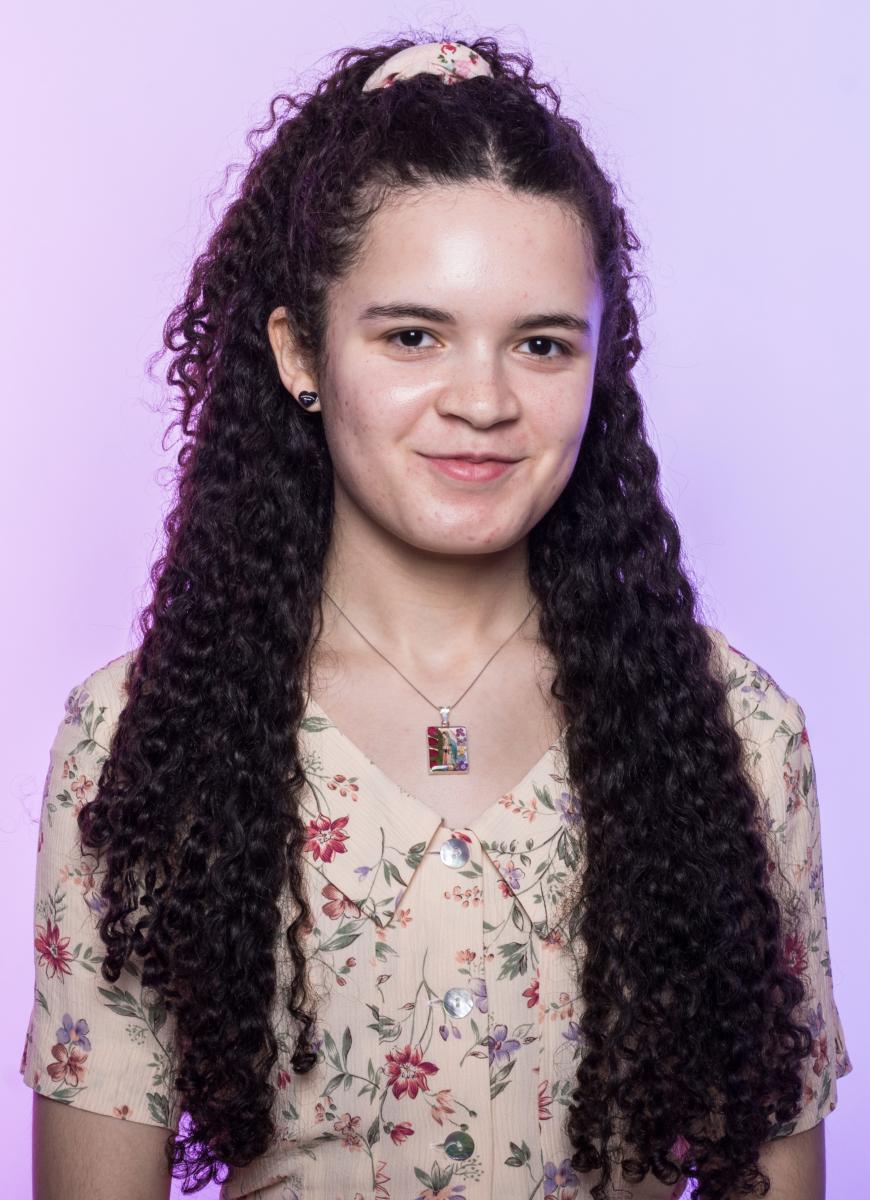
As part of my internship, I have attended Executive Board meetings for the section. It has been interesting to learn about all the different projects members have been working on. Some projects include the Reference and User Education Committee’s workshop for academic librarians and the Research Committee’s annual Research Award. The diversity in these projects shows that there are many opportunities for professional development within the section, which is something I greatly appreciate as someone who is relatively new to working in libraries. To that end, I have actually been helping the Research Committee in evaluating and scoring each submission and I’m honored to be involved in the process. It is downright inspiring to read the published work of librarians as it makes my own goals seem more attainable.
In addition to academic and research libraries, I am also interested in archives and preservation. Indeed, I am currently pursuing my Master of Information at Rutgers University with a concentration in Library and Information Science. However, I am also taking several courses from the Archives and Preservation concentration. Therefore, it was deeply rewarding when I got to attend the Archives & Special Collections Committee Spring 2023 meeting. I do not have experience working in archives yet either, so it was fascinating to learn from archivists about current issues in the field. Topics like digital archiving and drafting of land acknowledgements were just some of the subjects discussed at length. Attending this meeting only solidified my decision to take the international study course British Collections and Archives offered through Rutgers this summer. I also got to speak to Nicole Potdevin, President of the College & University Section and Associate University Librarian for User Services at Fairleigh Dickinson University about this opportunity, as Wroxton happens to be the overseas campus of Fairleigh Dickinson. All of this reinforces that I am in the right place.
Overall, interning for the College & University Section has been a rewarding experience. It has been awesome getting to know academic librarians and archivists within the section’s committees. Indeed, this internship has opened my eyes to how vast the field of librarianship really is and how invaluable it is to network with fellow library workers. Professional development is highly encouraged within the overall organization and this value is very important to me. I am so grateful that I was chosen for this opportunity and I look forward to continuing my involvement in NJLA for the rest of my library career.
2023 CUS/ACRL-NJ Research Award
Congratulation to the team of New Jersey librarians who published "First years’ information literacy backpacks: What’s already packed or not packed?," in The Journal of Academic Librarianship. They have been awarded the 2023 ACRL New Jersey Research Award.
These 10 award winners from 6 different institutions are: Joyce Valenza (Rutgers), Cara Berg (William Paterson), Brenda Boyer (Rutgers), Rebecca Bushby (formerly of TCNJ, now at U. of Southern Maine), Leslin Charles (Rutgers), Heather Dalal (Rider), Joan Dalrymple (Bergen CC), Megan Dempsey (Raritan Valley CC), Ewa Dziedzic-Elliott (formerly of Lawrence High School, now at TCNJ), and Gihan Mohamed (William Paterson).
This large cooperative research study examines if first-year college students who have had previous interactions with library resources and instruction in high school are ready for the rigors of college research. Authors surveyed first year college students and interviewed certified high school librarians in New Jersey regarding their efforts in teaching high schoolers library research skills. Authors discovered that first year college students who had high school librarians providing resources and instruction felt better prepared for academic research. See the project's libguide to learn more.
Kudos to the entire team for getting approved six IRBs and continuing to elevate New Jersey librarians with their seminal research on an important topic.
Submitted by Research Award Committee Chair, Dan Kipnis, of Rowan University.
On Exhibit: Paul Robeson: Activist, Artist, Actor, Alum
In honor of our namesake's 125th birthday on April 9, Paul Robeson Library proudly presents Paul Robeson: Activist, Artist, Actor, Alum.
The photo exhibit traces Robeson's remarkable life beginning with his childhood in Princeton, New Jersey, through his years as an athlete and academic at Rutgers University. Robeson not only excelled on the football field but also ran track and played on the baseball and basketball teams. Robeson was also a top student and tutored classmates in Latin and Greek. He was inducted into Phi Beta Kappa during his junior year and the Cap and Skull honor society his senior year as one of four students chosen for all-around excellence. Robeson graduated from Rutgers in 1919 and delivered the commencement address as the class valedictorian.
The exhibit also highlights Robeson's acting career, both on the stage and in films, and traces his commitment to social activism. For more about the incredible life of Paul Robeson, please visit "Honoring the Legacy of Paul Robeson" at Rutgers Today.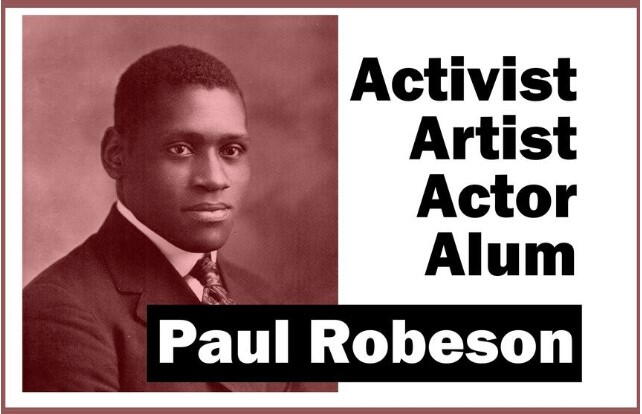
2023 CUS/ACRL-NJ Technology Award
The NJLA-CUS Technology Committee is excited to announce that we have selected two winning entries for this year’s Technology Innovation Award. The first honoree, Joyce DeStasio, Outreach & Public Services Librarian at Stockton University’s Richard E. Bjork Library, is being recognized for her Virtual Scavenger Hunt based on topics in Lynn Nottage's Sweat, Stockton's Fall 2022 Common Reading. Joyce used Google Slides and Springshare’s LibWizard platform to create a series of engaging multiple-choice questions on information literacy topics. This interactive online scavenger hunt was an effective outreach tool to the General Studies program and First-Year Seminars. As stated by the nominator, “Not only was this project undertaken during her first year as a librarian at our library, but it also acted as an effective outreach tool to the General Studies program on campus and demonstrated genuine creativity in its visual and instructional design. It made significant inroads with First-year Seminar instruction at Stockton and highlighted the library as an effective partner in delivering engaging instruction and course support.” Of 60 First-Year Seminar courses, 22 classes used the virtual scavenger hunt, allowing 450 of the 1,472 first-year students to complete it. The scavenger hunt is available on the Richard E. Bjork Library’s website here: https://stockton.libwizard.com/f/Sweat.
A team from the New Jersey Institute of Technology are our other winners. Maya Gervits, Director of the Littman Library, Monica Kenzie, Lead Archivist at Detroit Riverfront Conservancy (employed at the Littman Library during the project development), and Hyejin Hannah Kum-Biocca, Assistant Professor at NJIT’s Hillier College of Architecture and Design, are being honored for their work creating mobile applications (Android and iOS) with augmented reality features for the Digital Archive of Newark Architecture (http://dana.njit.edu). The Digital Archive of Newark Architecture website was developed eight years ago by the Littman Library; the mobile app that was completed last summer uses real-time geospatial data to allow users to obtain information on location about Newark landmarks. The application also uses Microsoft’s Hololens to project documents, drawings, and other textual and visual artifacts in three dimensions, allowing viewers to interact with information in a new and exciting way. The nominator states, “DANA is a powerful tool that has been incorporated into study, research, and practice, offering its users a deeper engagement with the city, its history, populace, and future trajectory. A juxtaposition of visual, textual, and audio-visual materials allows for a more complete, holistic picture of objects of study and helps make the past more accessible. The apps help increase the number of users and the site visibility and provides easily accessible information on Newark architecture, city planning, transportation, parks, public art, history, and preservation. Google Analytics confirms that DANA is being used internationally, reaching thousands of people in Europe, Asia, Africa, Australia, and the Americas.”
Congratulations to the winners of this year’s Technology Innovation Award!
Submitted by Technology Award Committee Chair, Janelle Bitter, of Raritan Valley Community College.
TikTok: Time to Reflect on the Past Year
By Jessica Chamberlain, Joyce DeStasio, & Sarah Hanlon
Last Spring, we wrote an article in this newsletter about a new focus at Stockton University’s Bjork Library on special media presence, specifically Instagram and TikTok. We discussed our outreach team’s intention to meet the student body where they already are. After a year of social media content creation and growth, we each looked back to reflect on what we’ve learned.
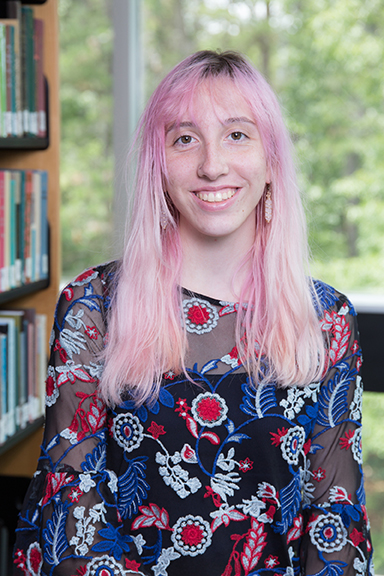 Sarah Hanlon (left), who is finishing her junior year as a Literature major, is our Student Body Liaison and offers a student worker’s perspective: Throughout the past year on TikTok, we have definitely experienced a learning curve when it comes to determining what content will resonate with our audience. We have strived to maintain a light-hearted, humorous tone that connects with students and patrons on a more casual, personal level. Many of our most successful ideas are developed by simply scrolling through our account’s For You page and assessing which trends seem to be the most popular and relatable. Participating in trending topics and audio immediately puts us in touch with what ideas interest our audience the most. We have found that planning posts too far in advance actually puts us at a disadvantage due to the rapid rate of trend turnover on TikTok. Staying on top of trends and creating content in the moment has been vital to our success.
Sarah Hanlon (left), who is finishing her junior year as a Literature major, is our Student Body Liaison and offers a student worker’s perspective: Throughout the past year on TikTok, we have definitely experienced a learning curve when it comes to determining what content will resonate with our audience. We have strived to maintain a light-hearted, humorous tone that connects with students and patrons on a more casual, personal level. Many of our most successful ideas are developed by simply scrolling through our account’s For You page and assessing which trends seem to be the most popular and relatable. Participating in trending topics and audio immediately puts us in touch with what ideas interest our audience the most. We have found that planning posts too far in advance actually puts us at a disadvantage due to the rapid rate of trend turnover on TikTok. Staying on top of trends and creating content in the moment has been vital to our success.
For many of our library workers, being on camera is not an expected part of the job description. However, as our social media presence has grown as a marketing priority for our library, the entire staff has gotten involved. We have had involvement from library employees in multiple departments, including circulation, tech services, public services, special collections, and administration. By including a variety of faces and service points, we are able to create a more well-rounded image and create content that addresses numerous library features and services.
Jessica Chamberlain (right), our Access & Engagement Coordinator and adjunct faculty member, a former undergraduate and graduate student at Stockton, offers her unique point of view: Teaching has provided an entirely new perspective on how students interact with our library’s socials. Starring in some of our TikToks, I was concerned that students would find it out-of-touch for their professor to show up on their For You page. These fears were quickly dismissed, as I found my students were excited that their professor was meeting them on such a relatable platform. On the first day of class, students were thrilled to see a familiar face; some even commented that they were fans of the library’s TikTok, expressing how the library has done a great job of staying on-trend and staying out of “cringe” territory. The words of affirmation and interest from students proved to all of us how important it was to get past the initial trepidation of being on camera. Our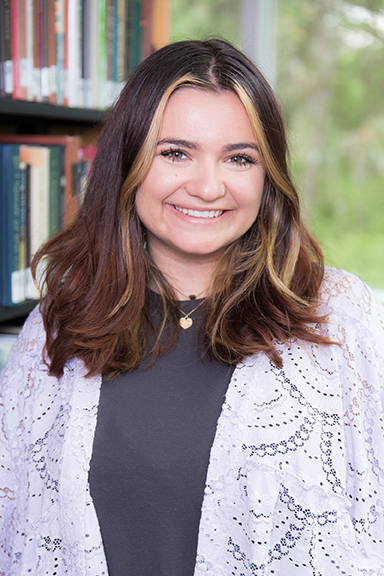 mantra of “meeting the students where they are” originally pushed us to get serious about our socials, and it has now actualized in the classroom. The students now use TikToks as argument sources in my Argument and Persuasion course, and continuously make suggestions as to how the library can continue on our socially aware path. We have learned from these classroom interactions that our socials really do bridge the gap between faculty/staff and students. Our TikTok trends have transcended into classroom conversations, creating meaningful connections and encouraging critical thinking.
mantra of “meeting the students where they are” originally pushed us to get serious about our socials, and it has now actualized in the classroom. The students now use TikToks as argument sources in my Argument and Persuasion course, and continuously make suggestions as to how the library can continue on our socially aware path. We have learned from these classroom interactions that our socials really do bridge the gap between faculty/staff and students. Our TikTok trends have transcended into classroom conversations, creating meaningful connections and encouraging critical thinking.
Joyce DeStasio (below), the Outreach Librarian, who leads the Outreach Team and oversees social media strategy across platforms, notes: Our most successful Instagram posts are Reels, and it comes as no surprise that our most successful Reels are reposts of our TikTok videos. We’ve found this to be very beneficial and efficient for us, not only because it promotes our TikTok account which shows our personality, but also because we’re generating more content for Instagram with less legwork and gaining a larger audience for this existing content. Whenever we can, we add movement and animation to our graphics and images, so that we can take advantage of Reels to get more views than our static posts. We’ve used this approach for everything from new book arrivals and holidays to photos of the library. Aesthetic library photos and images of our workers seem to be a big hit with our followers, more so than graphics and informational posts, so we make sure to intersperse them throughout our grid to add variety and promote our inviting spaces and faces. If we take it a step further and add graphic animation to the photos, which allows us to use still photography in a Reel, we’ve found we get even higher engagement. Of course, sometimes we just need to post informational graphics for events, hours updates, or news. And because photos of librarians/staff and library aesthetic photos perform better than strictly graphical or text-heavy information, we aim to use this imagery in these posts as much as possible.
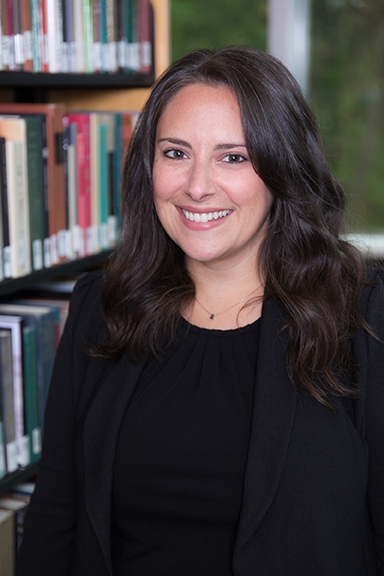 Recently, we’ve also organically become more selective about what we include on our profile grid. If something is timely and relevant but not necessarily part of our overall narrative, we will post it in our Stories. This is posted for just 24 hours and allows us to share more playful, in-the-moment content or re-share other accounts’ posts. We still post with the same or higher frequency, but there are fewer permanent grid posts. While we do have general goals for posting frequency, we are not as concerned about hitting certain post quotas as long as we continue to share information and engage with students, faculty, patrons, and other campus organizations.
Recently, we’ve also organically become more selective about what we include on our profile grid. If something is timely and relevant but not necessarily part of our overall narrative, we will post it in our Stories. This is posted for just 24 hours and allows us to share more playful, in-the-moment content or re-share other accounts’ posts. We still post with the same or higher frequency, but there are fewer permanent grid posts. While we do have general goals for posting frequency, we are not as concerned about hitting certain post quotas as long as we continue to share information and engage with students, faculty, patrons, and other campus organizations.
Overall, as we reflect on this past year, we have learned quite a bit, but it distills down to these takeaways: Don’t take yourself too seriously or be afraid to try new things. Flexibility and spontaneity are key–as long as you remain true to your mission, brand, and voice, of course! Follow us on TikTok and Instagram @stocktonu_library to see what we do next.
Joyce DeStasio (joyce.destasio@stockton.edu) is the Outreach Librarian and Jessica Chamberlain (jessica.chamberlain@stockton.edu) is the Access & Engagement Librarian at Stockton University. Sarah Hanlon (sarah.hanlon@stockton.edu), a junior at Stockton, is their Student Body Liaison.
Rutgers University Libraries News
Rutgers Joins the BTAA GeoportalRutgers University–New Brunswick is the newest member of the Big Ten Academic Alliance Geospatial Information Network (BTAA-GIN). As of Fall 2022, the Rutgers–New Brunswick Libraries have contributed 4,576 new records to the BTAA Geoportal (collection record | browse link). These records come from the previously digitized "Maps of New Jersey" collection, which spans over 300 years of the state's development from geographic, geologic, political, environmental, and historical perspectives. This digital collection is drawn from multiple repositories, including Rutgers Special Collections and University Archives, the New Jersey Environmental Digital Library, and several public library partners of the New Jersey Digital Highway. Included in the Rutgers collection are some rare and unique items from Special Collections and University Archives, such as this "Early Map of New Brunswick," which Francesca Giannetti, digital humanities librarian at Rutgers University Libraries, often uses in her mapping workshops to invite discussion about the similarities and differences with Google Maps, with which familiarity can generally be assumed. The comparison surfaces the ahistoricity of Google's interface as well as its slightly different prioritization of markers for commercial interests over public institutions and churches. Less frequently noticed is the fact that north is actually to the right in the historical map. Probing the reasons why New Brunswick might have been positioned above the Raritan River can be used as an invitation to examine the motivations and ideological underpinnings behind other cartographic conventions, such as meridians and projections. The Libraries' participation in the BTAA Geoportal will help increase exposure to the Rutgers cartographic and GIS collections and open the geospatial door to the state of New Jersey. To better serve their users, the Libraries are gradually updating older JPEG presentation files with IIIF-compatible pyramidal TIFFs. Special thanks are owed to Karen Majewicz, Melinda Kernik, and members of the BTAA-GIN Metadata Committee for their assistance with data cleanup, the addition of bounding boxes, and IIIF troubleshooting. The metadata and digital library work of many Libraries employees is now visible in the BTAA Geoportal, including that of Rhonda Marker, Isaiah Beard, Chad Mills, Al King, and Sue Oldenburg.
Early map of New Brunswick, NJ |
Institute of Jazz Studies Launches Count Basie Family Papers and Artifacts Finding Aid
The Institute of Jazz Studies (IJS) of Rutgers University Libraries is pleased to announce the launch of the much-anticipated Count Basie Family Papers and Artifacts finding aid. A native of Red Bank, New Jersey, William James “Count” Basie (1904–1984) was one of the giants of jazz, a global icon, and still one of the most influential, popular, and recognized figures in American music. The Institute acquired Basie’s papers and artifacts in 2018 and is responsible for ensuring its long-term preservation. The roughly 200-cubic-foot collection, consisting of more than 1,000 items, is unparalleled in its size and thorough documentation of Basie’s life and career, as well as those of his wife, Catherine, and daughter, Diane. The papers portion of his collection is now available to the public for research and enjoyment. The artifacts and remainder of the collection will be accessible in mid-2023. Please visit libraries.rutgers.edu/basie to access the finding aid. The Basie Family Papers and Artifacts document the vast impact of Count Basie’s enduring and storied career in jazz and American history and provide an unparalleled view of his family and private life. The collection is an essential resource for researchers in jazz, music, post-war American history, and American culture, especially black American culture. It is also critical for scholars, educators, writers, filmmakers, students, and the general public because of its breadth and depth. Count Basie's telegram to Catherine Basie on their anniversary (signed "Bill"; 1963) |
Editors
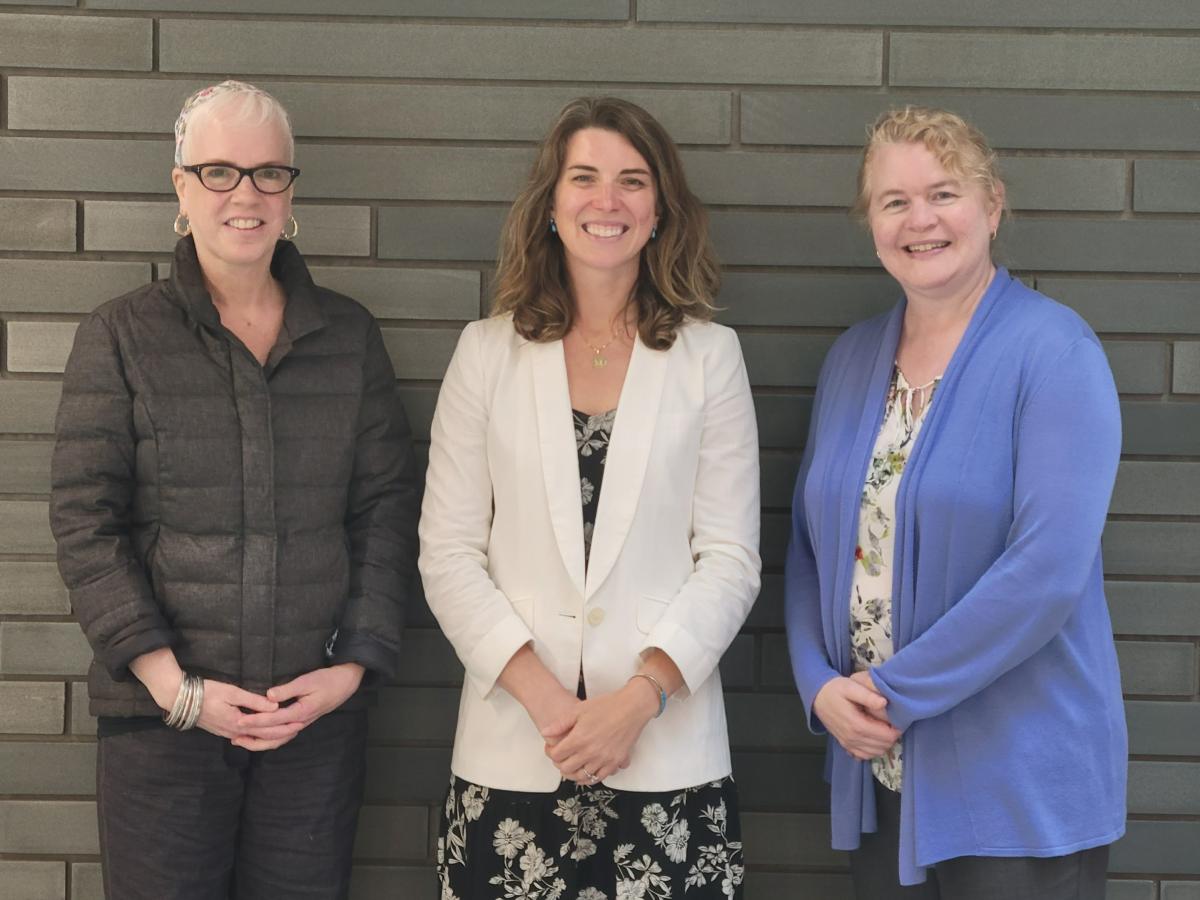
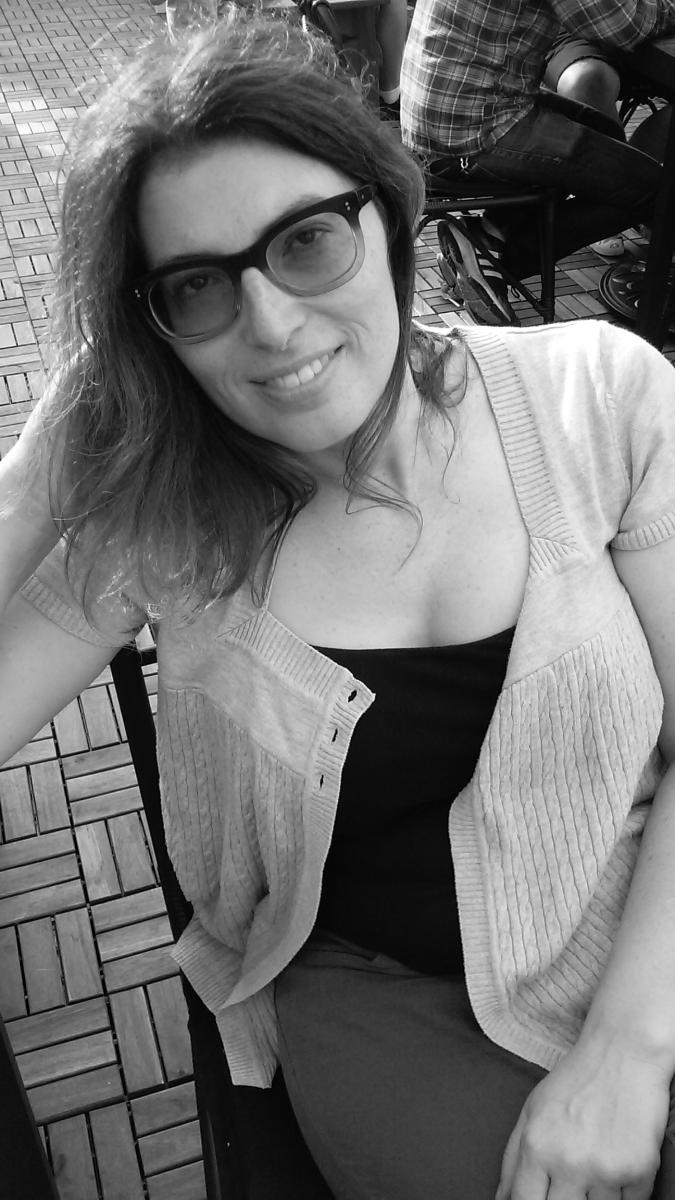 The CUS/ACRL-NJ Newsletter is edited by Joan Dalrymple, Reference and Instruction Librarian at Bergen Community College; Katie Maricic Cohen, Interlibrary Loan, Reference and Instruction Librarian at Ramapo College of New Jersey; Liz Siecke, Reference and Instruction Librarian/Serials Coordinator at Ramapo College of New Jersey, and Rachel King, Online Services & Scholarly Communications Librarian at the Cooper Medical School of Rowan University.
The CUS/ACRL-NJ Newsletter is edited by Joan Dalrymple, Reference and Instruction Librarian at Bergen Community College; Katie Maricic Cohen, Interlibrary Loan, Reference and Instruction Librarian at Ramapo College of New Jersey; Liz Siecke, Reference and Instruction Librarian/Serials Coordinator at Ramapo College of New Jersey, and Rachel King, Online Services & Scholarly Communications Librarian at the Cooper Medical School of Rowan University.
Editors Liz Siecke, Katie Cohen and Joan Dalrymple pose for a picture at Ramapo College's George T. Potter Library in Summer 2022 (right)
Editor Rachel King (above)

